Latest news
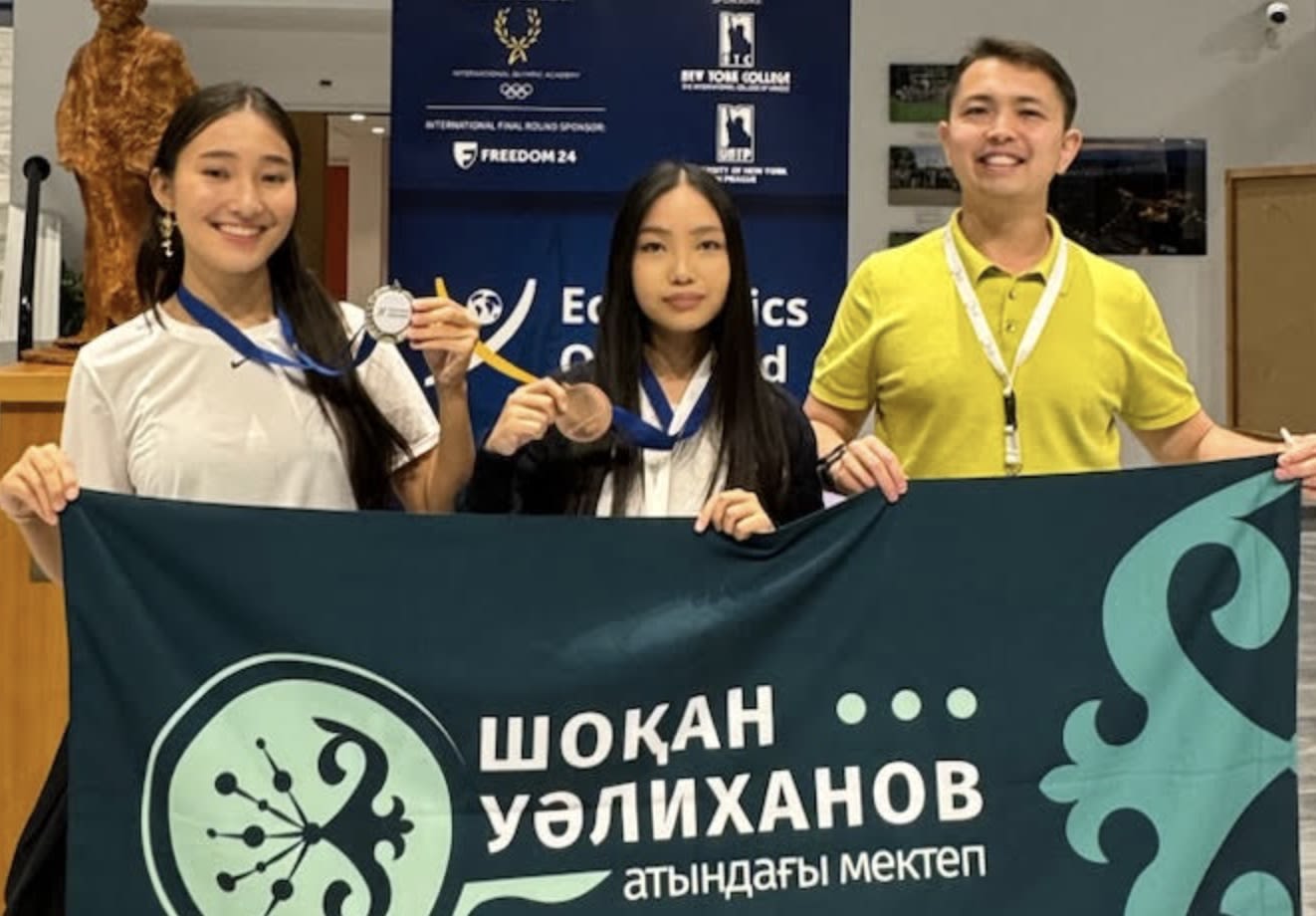
Kazakhstan: Two Young Leaders Promoting Economics Education
When Dinara Nariman and Tomiris Ospan returned from the International Final Round of the 2024 Economics Olympiad in Greece last September, bronze and silver medals in hand, they brought back more than just accolades – they returned with a vision to empower their fellow students in economics educatio...
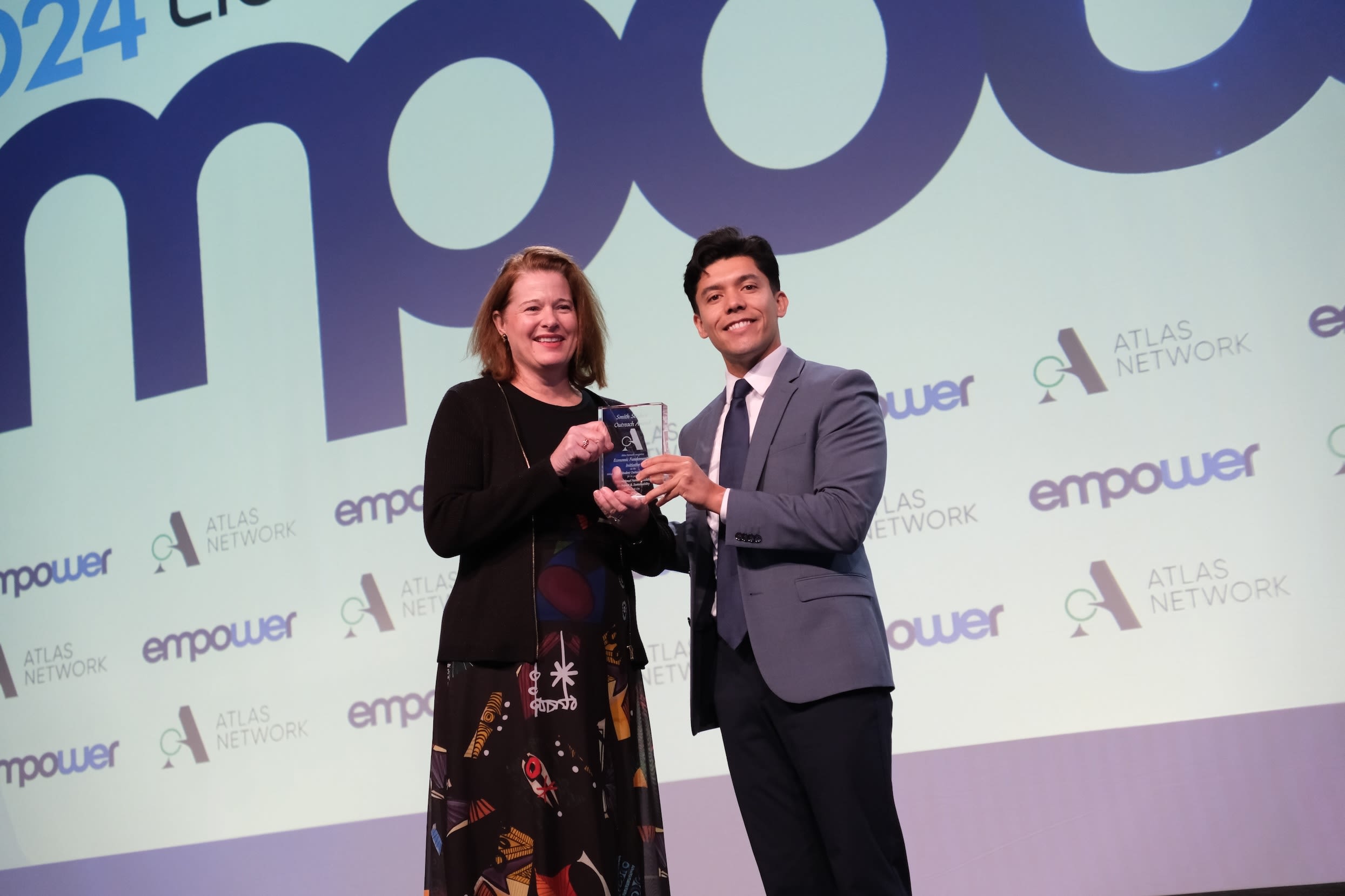
EFI receives 2024 Smith Student Outreach Award
The Smith Student Outreach Award recognizes projects which are shown to have had a tangible and meaningful impact for students. It is awarded annually at Atlas Network's Liberty Forum in New York. EFI is honored to have been selected as the recipient of the 2024 Award in recognition of our focus on network building for sustainability and impact.
EFI is now working with partners in 11 countries across Eastern Europe, the South Caucasus and Central Asia. Our support covers both common projects in which all partners participate, such as the Economics Olympiad, as well as specific local and regional activities that include seasonal schools and bootcamps. As the impact of our work becomes more visible, both EFI and our partners are securing new sources of local and international support from foundations, businesses and institutions. 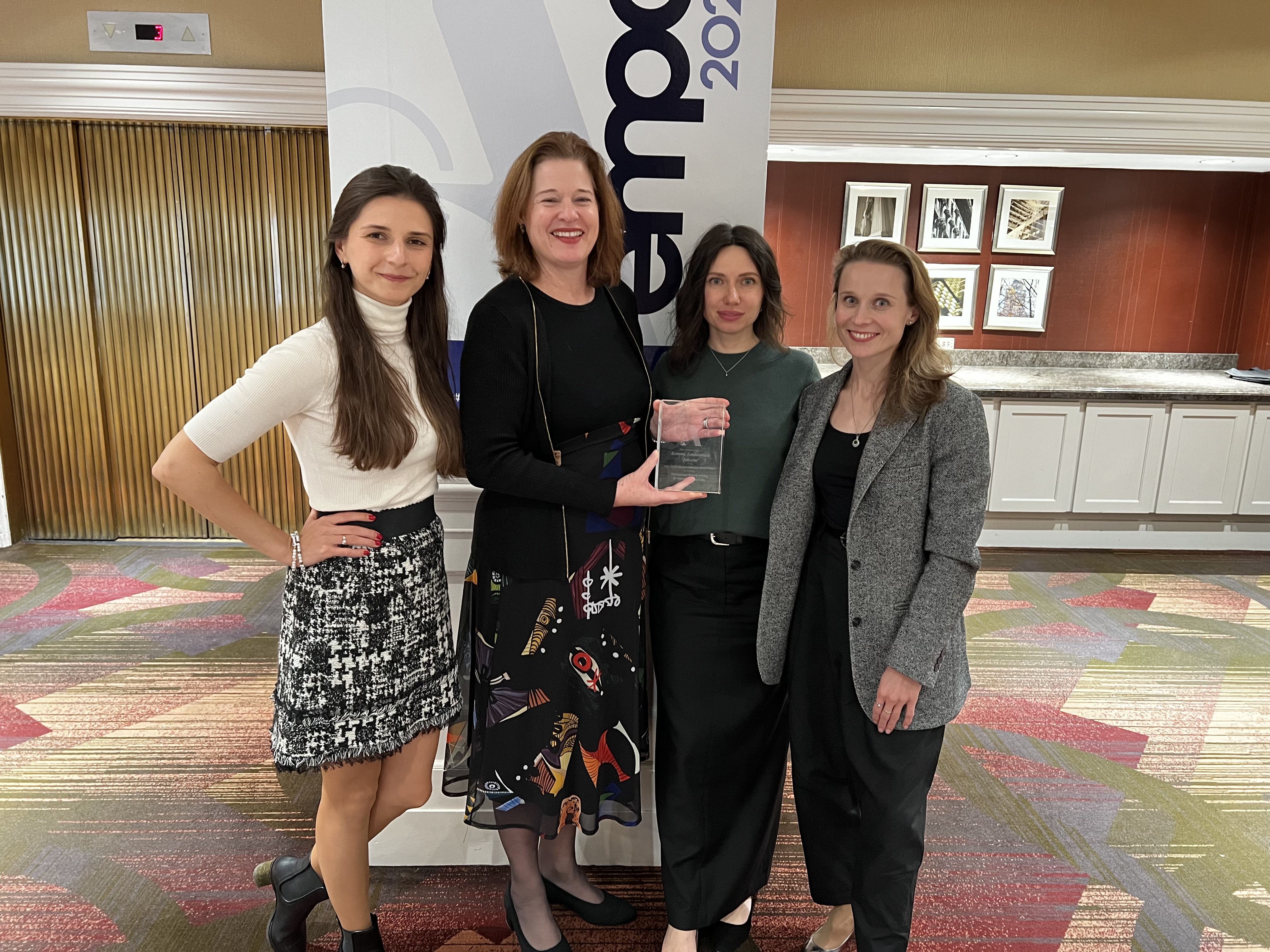
This year alone, we’ve entered 20,000 high school students from 10 countries in the Economics Olympiad. In 2025, we'll support 11 countries. We've also launched an inspiring teacher training program, piloting in Georgia, Kosovo and Ukraine, that has trained almost 200 teachers this year and will reach a further 450 in 2025. Our estimate is that over the next five years, these teachers will reach an estimated 200,000 young people.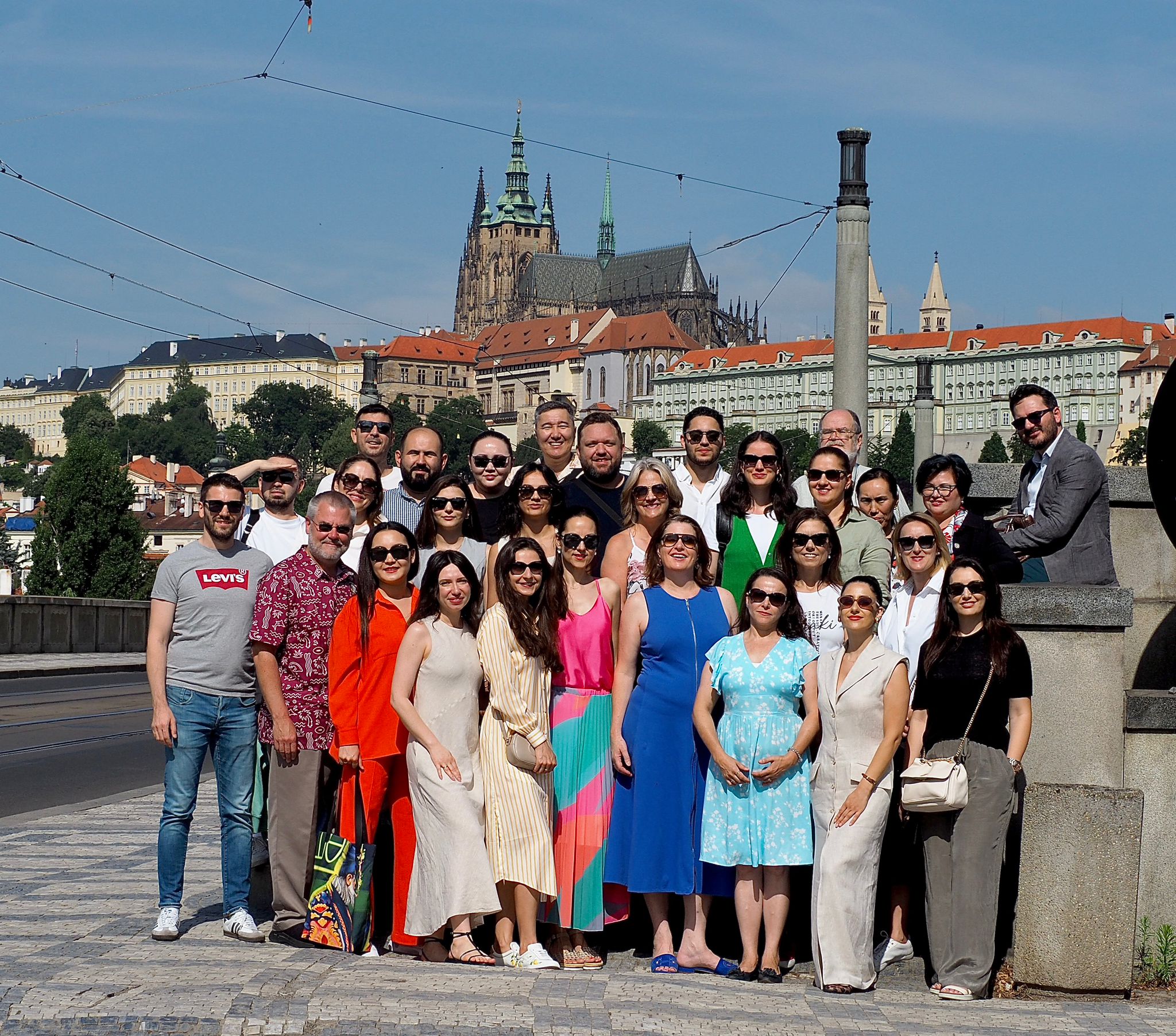 This award is inspiring recognition of the hard work and passion we share with our country partners. Our programs are building communities, transcending borders and exciting schoolchildren, students and their teachers to explore the economic way of thinking. We are grateful to the Smith Family Foundation and the Atlas Network for their support.
This award is inspiring recognition of the hard work and passion we share with our country partners. Our programs are building communities, transcending borders and exciting schoolchildren, students and their teachers to explore the economic way of thinking. We are grateful to the Smith Family Foundation and the Atlas Network for their support.
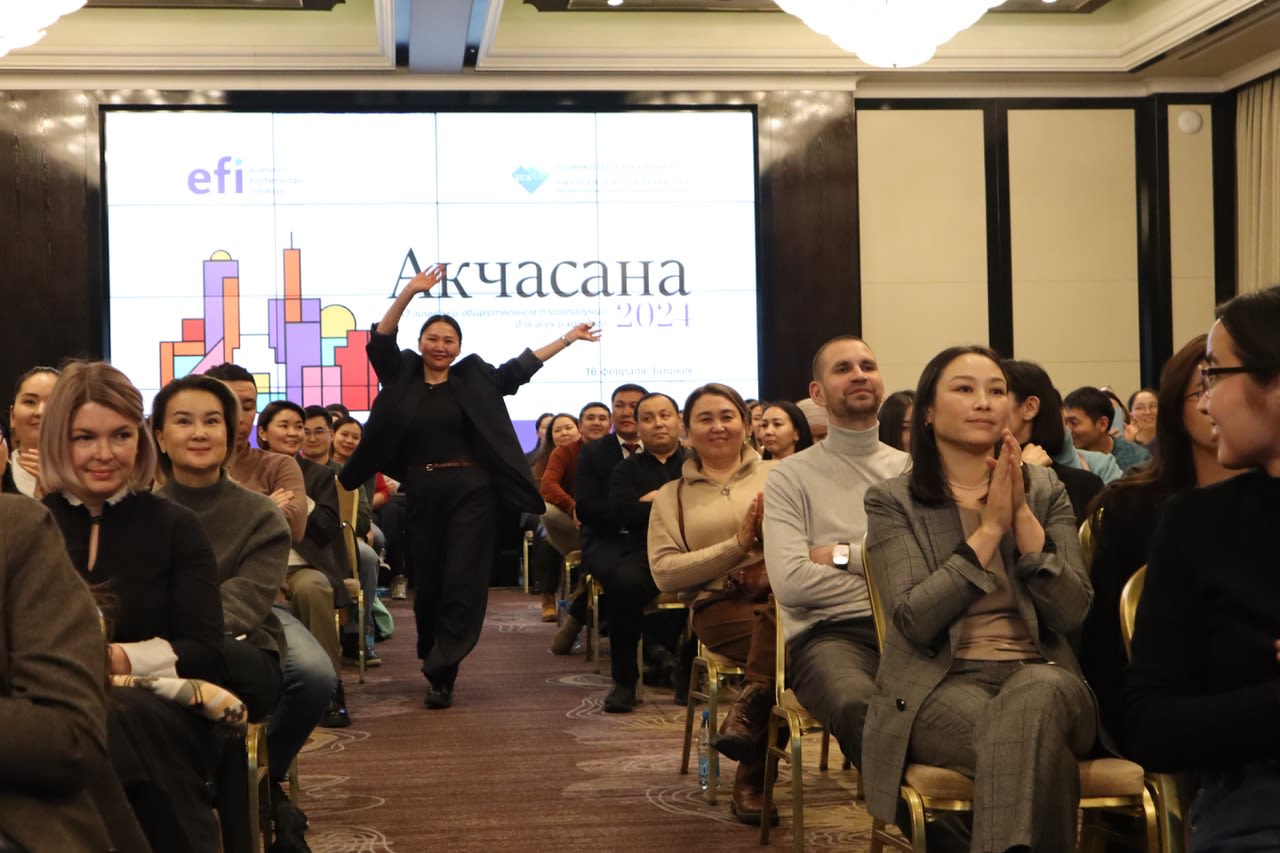
Kyrgyzstan: a combination of traditional and unorthodox tactics offers a promising route to improving economic and financial literacy
“People really value the things that we do”, says Kemel Toktomushev, Senior Research Fellow with the Institute of Public Policy and Administration at the University of Central Asia, EFI’s country partner in Kyrgyzstan. “Economic and financial literacy is something that is really lacking in our part of the world. Someone has to make a change”.
When EFI launched
the Kyrgyz edition of “Common Sense Economics” in late 2022, Kemel and his team
adopted a fully digital approach to promoting the book, leveraging the
country’s strong internet connectivity and low data costs. New TikTok and
Instagram accounts rapidly attracted thousands of followers, with content including educational
posts, quizzes, and videos on economic concepts such as SWIFT and currency
exchange rates. Earlier this year, a PR campaign involving 8 prominent
Kyrgyz bloggers reached nearly 300,000 young people and led to over 4,000
downloads of the book in just a few months. Kemel also uses his personal Instagram account, with now more than 50,000 followers,to promote economic and financial literacy. So widespread is his reach that he is regularly recognized by
Bishkek’s cabdrivers. So far, more than 18,000 copies of the book have been
downloaded across Kyrgyzstan. 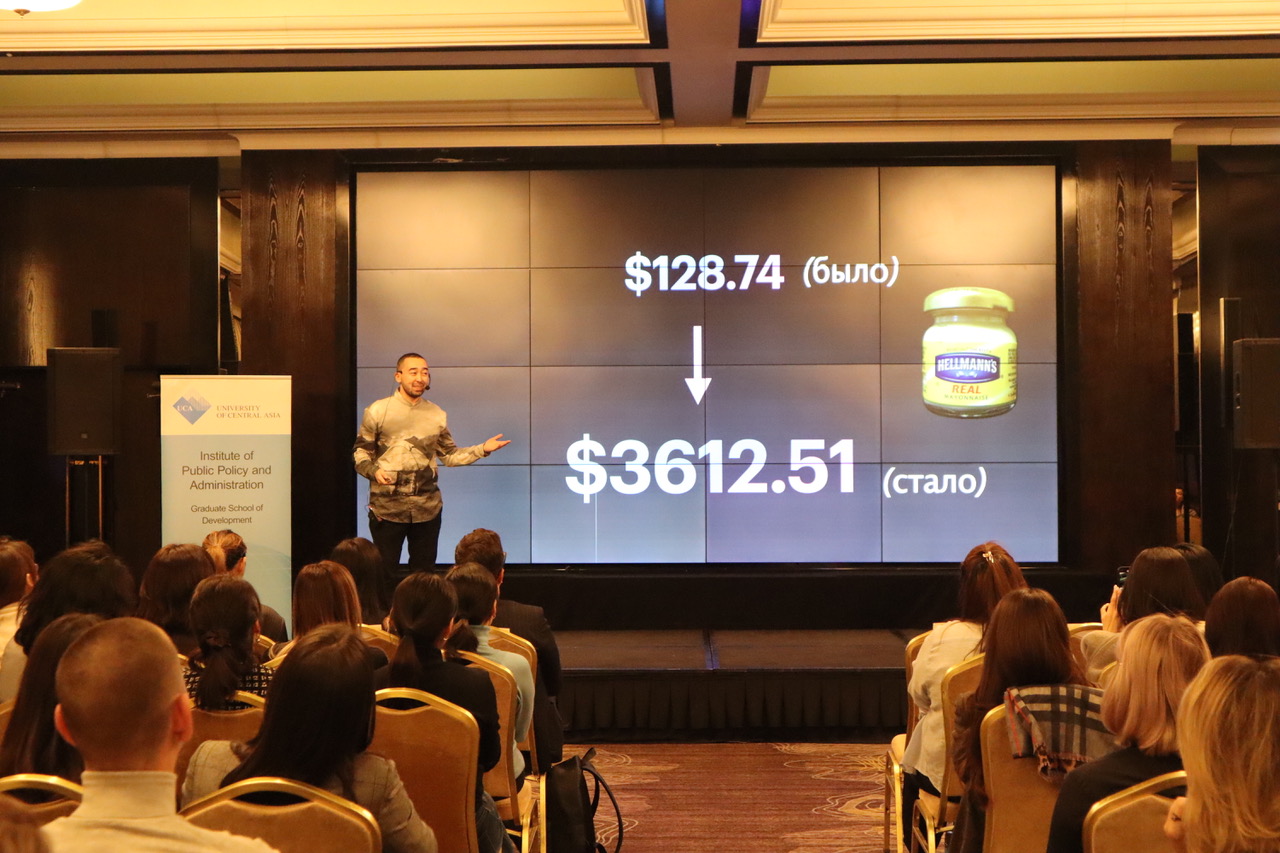 With support from
EFI, UCA launched its Akchasana
Conference, assembling entrepreneurs, businessmen, celebrities
and influencers to discuss investments, creative economics, financial literacy,
and career development with a student audience. The conference has now
become an annual event, attracting over 250 participants as well as growing support
from local partners including the American Chamber of Commerce.
With support from
EFI, UCA launched its Akchasana
Conference, assembling entrepreneurs, businessmen, celebrities
and influencers to discuss investments, creative economics, financial literacy,
and career development with a student audience. The conference has now
become an annual event, attracting over 250 participants as well as growing support
from local partners including the American Chamber of Commerce.
Together, EFI and
UCA brought the Economics Olympiad to Kyrgyzstan in 2022. This annual
international high school competition culminates in a final round held at
Ancient Olympia. In its first year in the country, almost 1700 students took
part, expanding to more than 2800 this year. The competition has attracted the support of the Ministry of Education and has already become
a cornerstone for promoting economic literacy. 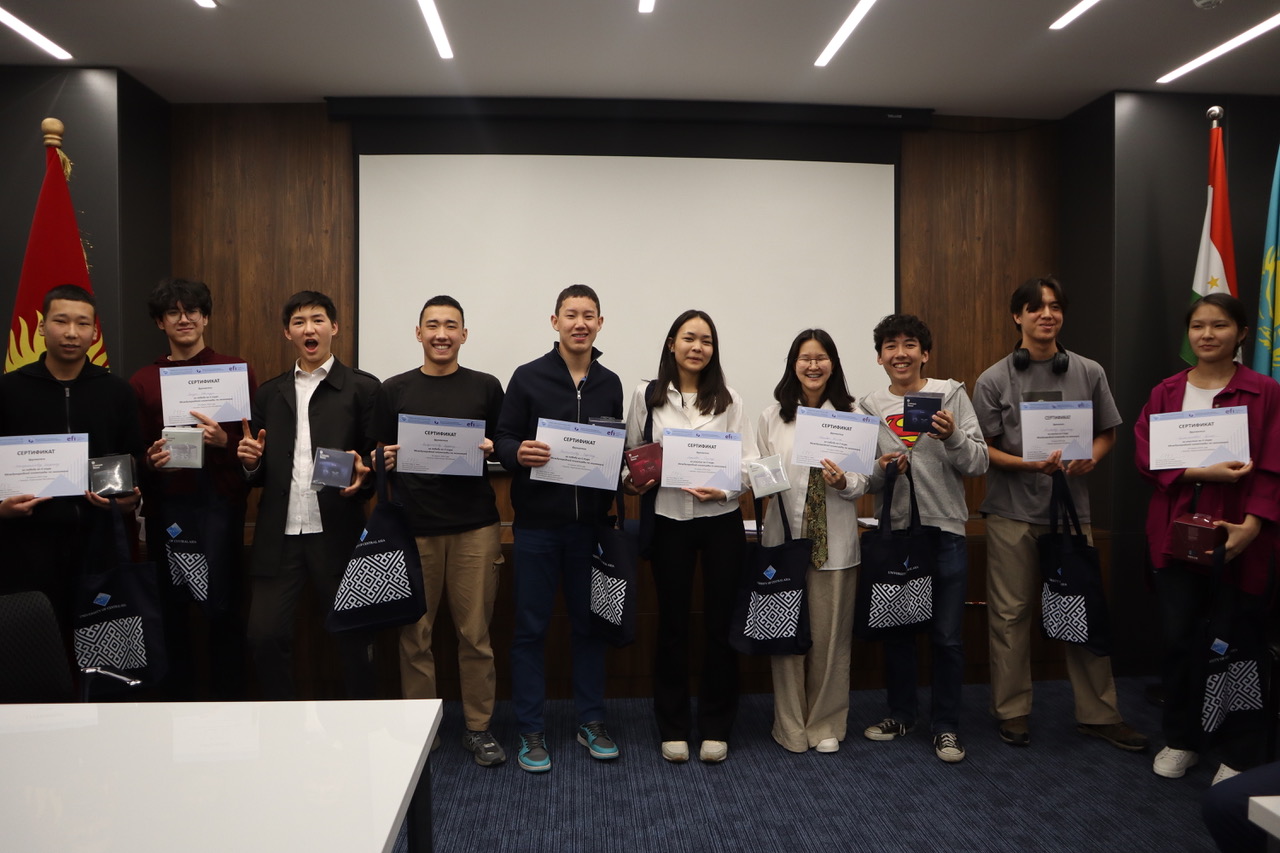 Munara Omuralieva, another member of the
EFI team at UCA, is drafting a chapter for an upcoming book that examines the
effects of COVID-19 on education in Kyrgyzstan. Her research is deeply
influenced by UCA’s partnership with EFI, reflecting the broader educational
impacts of the collaboration, both in Kyrgyzstan and in other countries across
the network.
Munara Omuralieva, another member of the
EFI team at UCA, is drafting a chapter for an upcoming book that examines the
effects of COVID-19 on education in Kyrgyzstan. Her research is deeply
influenced by UCA’s partnership with EFI, reflecting the broader educational
impacts of the collaboration, both in Kyrgyzstan and in other countries across
the network.
“This is the most exciting project initiative that I’ve been engaged with”, says Kemel. “It’s important and meaningful - and it’s fun. It really makes economics fun, and shows that it can be studied in an engaging manner”.
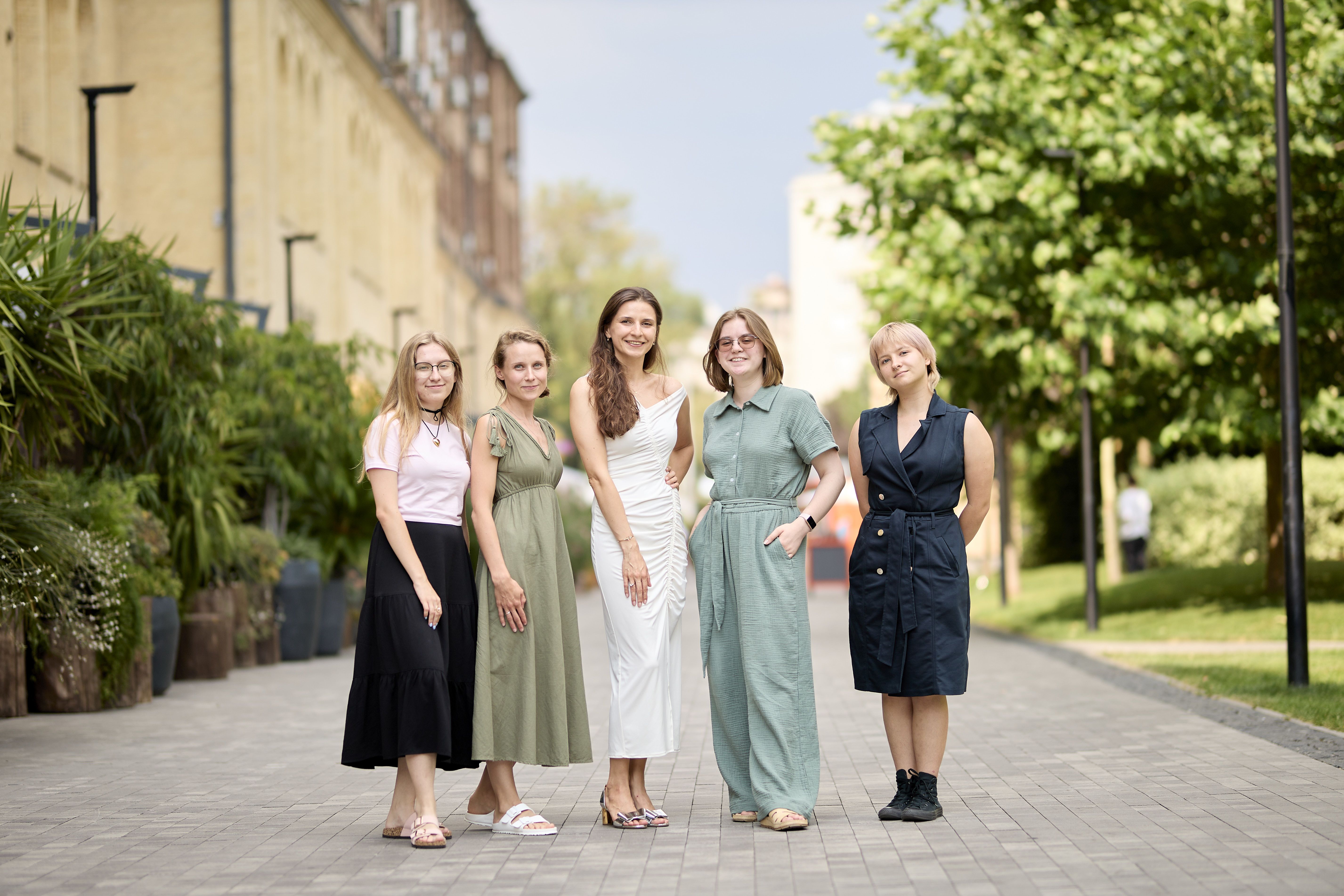
Ukraine: Bendukidze Free Market Center champions the case for increasing economic understanding in young people
The Kyiv-based Bendukidze Free Market Center was one of EFI’s early country partners, and has been a stalwart companion from our early days as book translator and distributor, to our evolution into the driver of an economic and financial literacy campaign that now spans 11 countries.
BFMC was keen to add the Ukrainian edition of “Common Sense Economics” to its portfolio of introductory economics texts. Since the translation was published in late 2020, BFMC has used the book as a core element in its portfolio to substantially increase its impact on economic understanding, particularly with middle, high school and university students, and their teachers.
Since publication, thousands of copies of the book have been
downloaded from the EFI website. 2000
printed editions have also been distributed to schools and universities and
included in “gift boxes” for teachers. “Common Sense Economics” is embedded in
“Economics for Every Day”, an economic literacy course hosted on Prometheus,
the country’s leading educational platform. So far, more than 25,000 customers
have completed the course. The book is already recommended reading for students
of economics and of political science at several universities, including
National Taras Shevchenko University and Ivano-Frankivsk National Technical
University of Oil and Gas. In summer 2024, the Ministry of Education approved the book as
recommended reading for elective economics at Grades 8 & 9.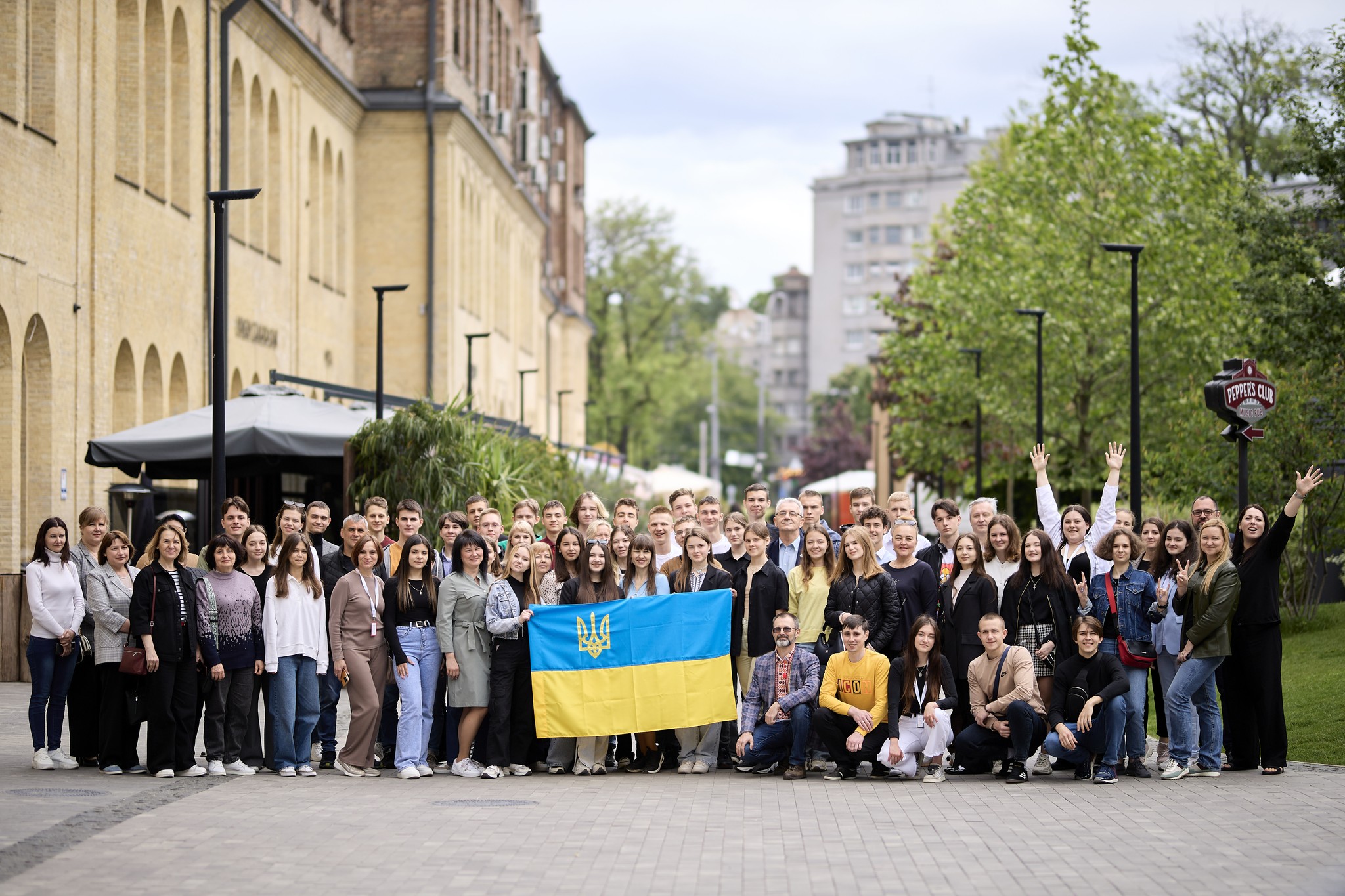 BFMC enjoys a strong and growing reputation with the
country’s teaching community. It boasts a range of innovative projects designed
to engage with, support and train educators, both with and without experience
of teaching economics. Right after the Russian invasion, it invited teachers to
compete for mini-grants, based on proposals to teach economics which harnessed
“Common Sense Economics”, EFI’s Teacher Toolkit and “Economics for Everyday”.
In the early months of the war, it added an Emergency Teacher Training program,
offering psychological support and immersive teaching techniques to teachers
for times of crisis. Its regional Economic Education Accelerators are an
immersive bootcamp program which has trained over 250 teachers in Poltava,
Dnipro and Kyiv, and help introduce Economics-related subjects in partnering
schools with the support of
educational investors Avrora Multimarket and mono. Ukraine is one of 3 countries taking part in a Teacher
Training Pilot co-funded by EFI and the Rising Tide Foundation which
aims to increase access to economics in secondary schools by providing teachers
with pedagogical training in an economic context. Almost 100 Ukrainian teachers
were trained this year. BFMC plans to double the numbers in 2025.
BFMC enjoys a strong and growing reputation with the
country’s teaching community. It boasts a range of innovative projects designed
to engage with, support and train educators, both with and without experience
of teaching economics. Right after the Russian invasion, it invited teachers to
compete for mini-grants, based on proposals to teach economics which harnessed
“Common Sense Economics”, EFI’s Teacher Toolkit and “Economics for Everyday”.
In the early months of the war, it added an Emergency Teacher Training program,
offering psychological support and immersive teaching techniques to teachers
for times of crisis. Its regional Economic Education Accelerators are an
immersive bootcamp program which has trained over 250 teachers in Poltava,
Dnipro and Kyiv, and help introduce Economics-related subjects in partnering
schools with the support of
educational investors Avrora Multimarket and mono. Ukraine is one of 3 countries taking part in a Teacher
Training Pilot co-funded by EFI and the Rising Tide Foundation which
aims to increase access to economics in secondary schools by providing teachers
with pedagogical training in an economic context. Almost 100 Ukrainian teachers
were trained this year. BFMC plans to double the numbers in 2025.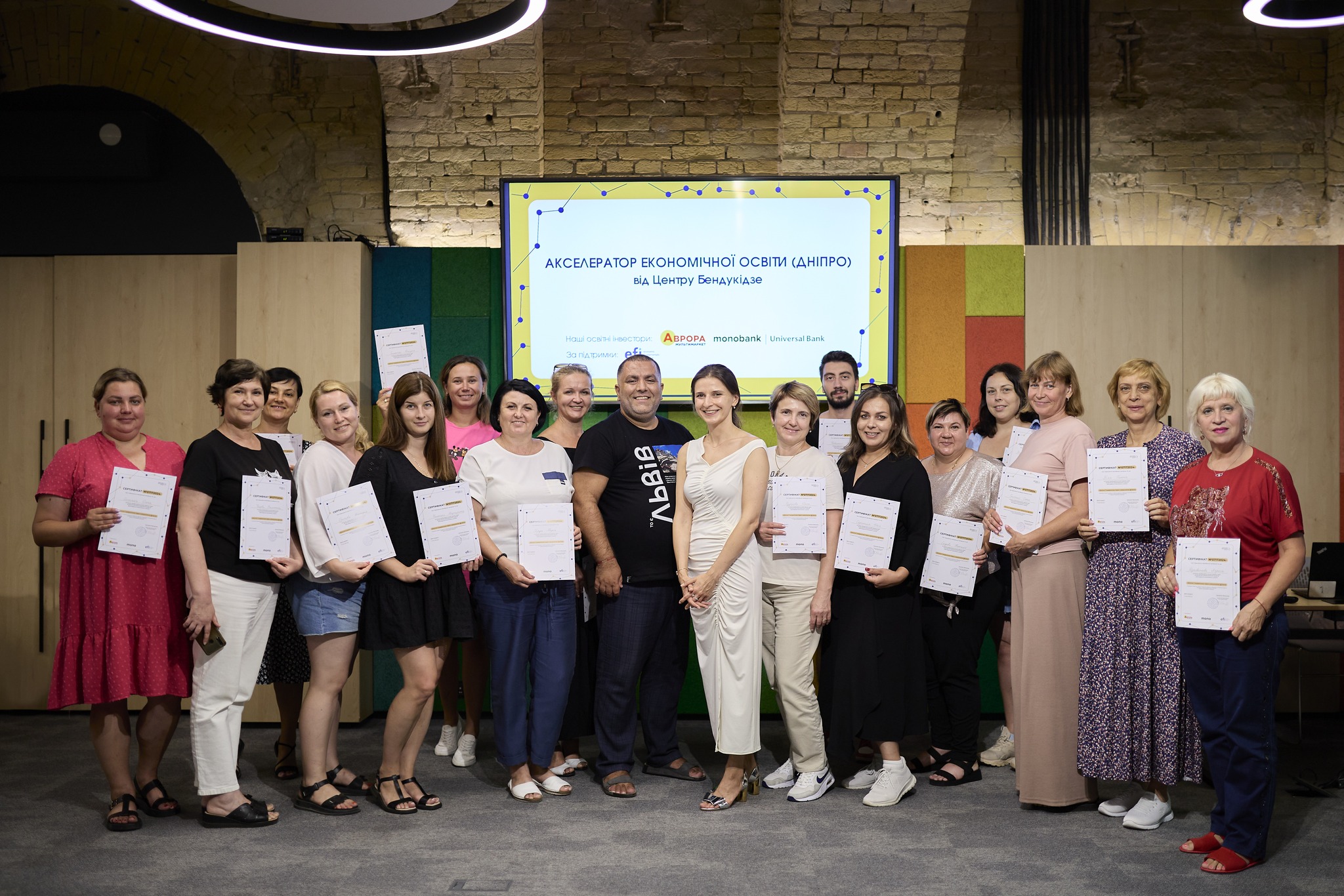 Supported by EFI, BFMC manages the [Economics Olympiad](https://economicsolympiad.org/) in Ukraine. BFMC registered 4,500
students in the first year, and the number of entrants more than doubled in
2024. Students compete in the face of power outages and air raid warnings,
travelling across the country to participate in the national round, which is
hosted by the Kyiv School of Economics. The competition is now promoted by the Ministry of
Education and the National Bank of Ukraine, helping BFMC to win the
confidence of local education departments. Growing numbers of donors are adding
their support and the Kyiv School of Economics offers full tuition and
accommodation scholarships to the 10 winners. “It might seem crazy that we launched a competition
in the middle of wartime’’, says Executive Director Nataliya Melnyk. “But so
many teachers and students thanked us for bringing the opportunity to them. EO
offers them hope, and some semblance of normalcy. And we will need economically
literate citizens to support the rebuild when this war is finally over. That is
why having EFI’s backing for our educational initiatives is so crucial”.
Supported by EFI, BFMC manages the [Economics Olympiad](https://economicsolympiad.org/) in Ukraine. BFMC registered 4,500
students in the first year, and the number of entrants more than doubled in
2024. Students compete in the face of power outages and air raid warnings,
travelling across the country to participate in the national round, which is
hosted by the Kyiv School of Economics. The competition is now promoted by the Ministry of
Education and the National Bank of Ukraine, helping BFMC to win the
confidence of local education departments. Growing numbers of donors are adding
their support and the Kyiv School of Economics offers full tuition and
accommodation scholarships to the 10 winners. “It might seem crazy that we launched a competition
in the middle of wartime’’, says Executive Director Nataliya Melnyk. “But so
many teachers and students thanked us for bringing the opportunity to them. EO
offers them hope, and some semblance of normalcy. And we will need economically
literate citizens to support the rebuild when this war is finally over. That is
why having EFI’s backing for our educational initiatives is so crucial”.
● Watch teachers in Ukraine making the case for the economic way of thinking (video)
● Why Ukraine’s high school students are embracing the economic way of thinking (video)

Train-the-trainer workshop in Prague launches Teacher Training Pilot
EFI’s Teacher Training Pilot is a project with limitless ambition: our goal is nothing less than to expand and improve the quality of economics teaching and to offer a pathfinder for countries seeking to raise their national standards of economic and financial literacy.
The pilot is being run in 3 very different countries: Georgia, Kosovo and Ukraine. A train-the-trainer approach is key to enabling this project to grow rapidly, both in these countries and beyond. Each country has recruited a pool of trainers, all experienced high school and university teachers, who will lead teacher training courses, starting this summer. Our trainers have now completed an intensive train-the-trainer workshop, in which English was the language of delivery. They return to their home countries to deliver this training in their native languages. By September, the first 210 teachers will have been trained. Our goal is to triple this number in the project’s second year.

The design team is made up of academic economists and pedagogical experts with decades of experience: EFI President, Prof. Randall Filer, Florida State University professors Joe Calhoun and Tawni Hunt Ferrarini, and Prof. Gina Riley, educational psychologist and program director at Hunter College, New York. All have generously donated their time and expertise, as have our first trainers. All are inspired by the potential of this groundbreaking project. Reflecting on the workshop a couple of days after its close, Joe mused: “That was one of my most rewarding professional development experiences”.

Natela Mshvidobadze, a member of the Georgian team, summed up the group’s feelings at the end of the week: “This training was not just professional development, it was personal awakening! I saw economics education in a new light. The content was top-notch, delivered seamlessly with outstanding organization. And the trainers? They were phenomenal! I feel excited to share this newfound economic knowledge with other teachers. I can't wait to start revolutionizing the way economics is taught in Georgia!”
The Economics Pedagogy Training Course isn’t just about teaching economics. It’s about giving teachers the tools and techniques they need to teach high school students in a classroom environment which encourages them to think critically and to apply their learnings to their everyday lives. Modules include: Importance of Effective Economics Instruction, Creating Classroom Culture and Lesson Planning, Leveraging Ed Tech/AI in Lessons, innovative assessment methods and Integration of Essential Concepts and Project-Based Learning.
Our approach to training is far from “one and done”. Trainers and teachers alike join an online multinational community where they will have access to a growing collection of teaching materials provided in English and local languages. Webinars and open office hours will be offered by the design team and additional experts. Mentors will be available to both teachers and trainers.
As the project evolves, we’ll be providing regular updates. If you’d like to learn more in the meantime, reach out to us at gergana.sazlaykova@econfun.org. EFI is immensely grateful to the Rising Tide Foundation for their support for this project.

Georgia – a new NGO committed to bringing economic literacy to the nation’s education system
In late 2021, three driven young economists, fueled by a shared passion to improve national standards of economic and financial education, formed the Georgian Economic Literacy Initiative GELi. Recognizing the importance of understanding economics and finance in everyday life, they embarked on a mission to make these subjects more accessible and relevant to everyone. GELi envisions a future where economic literacy is integrated into the national educational system, empowering individuals to make informed financial decisions and to contribute actively to Georgia's economic development.
GELi’s founders are all experienced teachers of economics and finance at universities both in Georgia and other countries. With the support of the Economic Fundamentals Initiative, in a remarkably short space of time GELi has made impressive strides in advancing its mission, designing a host of inspiring programs for teachers and students, and engaging with national organizations to effect change.

GELi is finding innovative ways to excite students to explore economics and finance: it has designed and is teaching a mandatory economics course to students at Tbilisi’s Komarov School and Sachkhere #2 Public school, which inspired the development of EFI’s Teacher Toolkit. So far, 500 students have already taken the course. A Financial Literacy Tour reached 2,600 high school students in 10 regions. Last year, GELi introduced to Georgia the Economics Olympiad, an international high school competition. 1,300 high school students across 200 schools took part and this number is expected to increase significantly this year. And in 2023, the Zarzma Monastery Academy project was launched, an initiative for school students in the Samtskhe-Javakheti region, which aims to provide them with valuable economic education. Forty school students are currently enrolled in an economics class taught three times a week, which allows them to delve into the fundamentals of economics and explore its real-world applications.
GELi also provides innovative professional development opportunities for teachers: 100 teachers have already participated in a workshop "How to teach economics", while more than 200 teachers of a range of subjects from geography and civic education to mathematics and history, also participated in "Economics in other subjects" workshops.
Supported by EFI and media platform Orjer Ori, GELi has produced "Five Minutes About Economics," a video project which explores complex topics in bite-sized segments, thereby empowering viewers to grasp fundamental economic principles in a concise and engaging manner.

Today, GELi is collaborating closely with the Ministry of Education to develop a comprehensive curriculum for civic education classes, placing significant emphasis on integrating economics. The team is also preparing a report to underscore the importance of incorporating economics in school education and will outline various strategies and methodologies for effectively teaching the subject in schools. GELi is also creating tailored study materials for vocational education agencies and institutions.
GELi has formed a range of strategic partnerships including the Bank of Georgia, Business Media Georgia, Free University, PH International and Orjer ori. These partnerships have been instrumental in expanding the reach of GELi's initiatives.
Bakari Baratashvili, co-founder and director of GELi, comments: “Our aim is that Georgian citizens should understand the fundamentals of economic prosperity, the importance of free markets and the role of limited government as well as the principles of making sensible personal economic decisions and long-term financial planning. EFI’s dedication to promoting economic education helps GELi to stay focused on the path of achieving its mission and helping Georgian citizens to be economically literate and informed contributors in the economic, social and political life of our country."

Kosovo: Riinvest Institute as pioneer of liberal economic thinking
Pristina-based Riinvest Institute is Kosovo’s oldest think tank and a pivotal force in the country’s economic evolution. Founded on a mission to promote sustainable economic development, Riinvest produces analyses, publications, and research reports, but its contribution extends beyond theoretical contributions to active involvement in market development, sector interventions, and value chain initiatives.

Riinvest has been involved in the EFI project from the outset. Its economists were among the subject matter experts overseeing the translation of “Common Sense Economics”, published in early 2021. It was a natural evolution to invite Riinvest to be EFI’s country partner. Their EFI-related activities have evolved from running promotional workshops and essay contests for students, to TV appearances, economic reporting workshops for journalists and, from 2023, organizing the Economics Olympiad for high school students. This year, Riinvest is one of three EFI country partners participating in a teacher training pilot which will provide high school teachers with pedagogical training and teaching materials for introductory economics.

“EFI partners come from many different countries, so they bring diverse and complementary perspectives to our joint mission. It’s a really unusual and inspiring project environment. Partnering with EFI, we are bringing complementary economics literature to students, emphasizing that a basic understanding of economics is a core skill sought by so many employers,” says Visar Vokrri, Riinvest’s Program Director. “It’s a joy to work with the team at Riinvest who are as passionate as we are to be exciting interest in learning and teaching economics” says Eleanor Hammond, Executive Director of EFI. “Together, we have the opportunity to improve economic and financial literacy in Kosovo, contributing to the country’s economic resilience and growth”.

Thanking James Gwartney, pre-eminent economist and educator
The EFI community is saddened by the death of James Gwartney, lead author of “Common Sense Economics” and co-author of the Economic Freedom of the World Report. Jim, Professor Emeritus at Florida State University, was the embodiment of the phrase "a gentleman and a scholar." His career was dedicated to increasing understanding of economics at all levels.
 Jim was a staunch supporter of EFI and our mission to improve economic literacy and education. We are honored to contribute to his legacy, distributing 9 language editions of “Common Sense Economics” through our country partners across Eastern Europe and Central Asia. Thanks to the generosity of its authors, the book can be downloaded for free from econfun.org, is a recommended reading for students enrolling in the annual Economics Olympiad, and forms the core of EFI’s Teacher Toolkit. We are grateful to co-authors Professors Joe Calhoun and Tawni Hunt Ferrarini for their ongoing support.
Jim was a staunch supporter of EFI and our mission to improve economic literacy and education. We are honored to contribute to his legacy, distributing 9 language editions of “Common Sense Economics” through our country partners across Eastern Europe and Central Asia. Thanks to the generosity of its authors, the book can be downloaded for free from econfun.org, is a recommended reading for students enrolling in the annual Economics Olympiad, and forms the core of EFI’s Teacher Toolkit. We are grateful to co-authors Professors Joe Calhoun and Tawni Hunt Ferrarini for their ongoing support.
We are pleased to share this tribute written by colleague Bob Lawson as published by the American Institute of Economic Research.
Remembering James Gwartney, 1940-2024

James (Jim) Gwartney, 83, died peacefully in his home in Tallahassee, Florida on January 7, 2024. Gwartney was a professor of economics at Florida State University (FSU) for 53 years. He will be remembered as a prolific scholar, economic educator, and public intellectual.
Gwartney was born in rural Kansas and worked on his family’s farm; his early education took place in a one-room schoolhouse. In later years, he would say that his passion for teaching began there because the older students were expected to help teach the younger ones. He then attended Ottawa University in Kansas where he studied under future Federal Reserve Governor Wayne Angell.
He earned his PhD at the University of Washington writing his dissertation on the economics of labor market discrimination, which led to his first publication in the prestigious American Economic Review. At Washington, Jim took numerous courses from future Nobel Laureate Douglass North, and his interest in institutional economics began at this time. He learned his microeconomics from greats like Walter Oi (who was blind and thus would become an inspiration for Jim in later years) and Yoram Barzel, and he took a course in public choice economics from Tom Borcherding, who had been a student of future Nobel Laureate James Buchanan.
After graduation, Jim was hired in 1969 as a professor at Florida State University in Tallahassee, where he remained until his retirement in 2022. In the early years, Jim paid his dues by publishing in numerous top journals thus earning his tenure and promotions. Although he will be remembered more for his public-facing accomplishments, he continued writing and publishing in scholarly journals until the very end of his life. Gwartney’s enduring legacy will come in three areas:
First, he was a master economic educator. His textbook, Economics: Private and Public Choice, initially published in 1976, will soon enter its 18th edition. He was joined over the years in this effort by coauthors Richard Stroup, Russell Sobel, and David Macpherson. One of the most important themes of the textbook is that any realistic understanding of the economy requires us to understand not only how markets may fail but also, by applying the insights of public choice economics, how governments may fail. The idea of government failure has slowly percolated into many, though by no means all, of the economics textbooks on the market, but it was Gwartney’s textbook that showed it for the first time. The textbook also took a stand against the prevailing Keynesian macroeconomic view that the economy needed to be steered by omniscient and omnipotent central planners to stay on track. In 1993-94, Gwartney took a leave from FSU to teach using his textbook at the Central European University in Prague; this was right after the fall of the Iron Curtain, and he was keen to teach free-market economics to the students who had come from a central planning background.
In more recent years, Gwartney, with coauthors Richard Stroup, Dwight Lee, Tawni Farrarini, and Joseph Calhoun, came out with Common Sense Economics: What Everyone Should Know about Wealth and Prosperity. The book and the accompanying teaching materials are designed to be a more accessible introduction to economics and personal finance. Finally, he ended his career as the director of the Gus A. Stavros Center for the Advancement of Free Enterprise and Economic Education at FSU, where he worked to improve the state of K-12 economic education in Florida and beyond.
Second, Gwartney will be remembered as a founder of the Economic Freedom of the World (EFW) index, which is published by Canada’s Fraser Institute. The index was the brainchild of Rose and Milton Friedman and the Fraser Institute’s founder Michael Walker, who organized a series of conferences beginning in the late 1980s to investigate the feasibility of creating a quantitative measurement of economic freedom by country. Gwartney frequently told the story about how he received his invitation to attend the second such meeting in Vancouver in 1988. He was going to decline it (thinking to himself: How can you possibly *measure *economic freedom?) until he saw the invitation came from Milton Friedman himself, so he fired off his acceptance. After a third meeting in Banff, Gwartney and Walter Block (along with his graduate assistant at the time Robert Lawson) hatched a plan to create an economic freedom index based on a small but gettable number of indicators for a large number of countries. Prototypes of this index were presented at the fourth and sixth meetings in the series, and the final product was published in 1996. The EFW index has been released annually ever since and now presents an economic freedom rating for 165 nations based on several dozen indicators.
The EFW index is covered by a wide array of media outlets annually, and government officials are frequently forced to answer embarrassing questions from the media about why economic freedom is lower than in other nations or is falling. The EFW index has also had a tremendous impact in academic circles. To date, over 1,300 peer-reviewed journal articles have been written citing the EFW index, with most finding that economic freedom corresponds to higher incomes, faster growth, and a whole range of beneficial outcomes in other areas such as health, civil rights, and peace.
In 2009, Gwartney summarized much of his own work on economic freedom:
“During the past 15 years, economists have become increasingly aware that institutional factors exert a strong impact on both the level and productivity of investment, the rate of economic growth, and the variation in income levels across countries. Some even argue that ‘institutions rule.’ I am not willing to defend that position, but I do think it is clear that institutions matter and that they matter a great deal.”
Third, Gwartney will be remembered as a public intellectual. As his work on the textbook and with the EFW index demonstrate, Gwartney was never content just to publish journal articles for other economists to read. He wanted to reach the general public and influence policy. After conducting a study with Randy Holcombe and Robert Lawson about the optimal size and scope of government for the Joint Economic Committee (JEC) of Congress in 1998, Gwartney served as Chief Economist for the JEC in 1999-2000. This experience led to his trip with a small team of free-market-oriented economists to meet Putin in Russia at the invitation of his economic advisor Andreǐ Illarionov. It may be hard to remember now, but in Putin’s early years in office, he was seen as a supporter of market-liberal reforms. In fact, shortly after Gwartney’s visit, Russia lowered its top marginal income tax rate from Soviet-like levels as high as 80 percent to a flat, low 13 percent. Russia’s economy initially boomed before Putin reneged on the liberal reforms he had started and returned Russia to its kleptocratic ways. Though a failure in the end, Gwartney’s experience in Russia shows his long-standing willingness to get out of the Ivory Tower and actually engage the wider world.
Gwartney was a member of the Mont Pelerin Society. He served as president of the Southern Economic Association in 2007-2008. He had a long-time affiliation with the Association of Private Enterprise Education (APEE). He was APEE’s president, received its prestigious Adam Smith Award, and was awarded APEE’s Clark-Kent-Aronoff Service Award (jointly with his wife, Amy). The Gwartney Institute with the mission to study economic freedom, social justice, and human flourishing was established in his honor at his alma mater Ottawa College in 2018. Upon his retirement in 2022, FSU established the James and Amy Gwartney Scholarship Endowment (donate here).
Jim Gwartney was more than a great economist. His enduring faith in God and his devotion to Amy, his wife of 61 years, were an example to many. Everyone who knew him knows he was one of the kindest and most generous people they had ever met. Gwartney faced life’s many challenges with an inspirational amount of grace and dignity. He survived a life-threatening cancer in the late 1970s, and then battled eye problems that led to blindness for the last 30 years of his life. Despite it all, he was working on textbook revisions and conducting economic freedom research right up until his final days.

Georgia: the monks helping students realize their potential
Nestled in a remote and isolated valley in southwest Georgia, the village of Zarzma is home to a remarkable educational project. In addition to their painstaking work restoring the 14th-century monastery they call home, a small group of Georgian Orthodox monks teach at the village’s middle school, introducing teaching methods and creating a learning environment which is inspiring their students to reach new levels of achievement.
In 2009, the monks launched an enhanced mathematics program, the Zarzma Children’s Academy, for children in Grades 6-9. Since then, each year a small number of students from the academy have been admitted to Komarovi, Georgia’s leading high school for Mathematics and Sciences, in the country’s capital, Tbilisi. 25% of the boarders at the school are now from Zarzma. With support from EFI and country partner GELi, Komarovi has been teaching introductory economics for Years 10 and 11 since 2021, a project which inspired the development of EFI’s Teacher Toolkit.

Admission to the academy is considered highly prestigious. Learning, transportation and meals are provided free of charge thanks to support from private donors and local authorities. The monks are delighted that the early cohorts of students have returned to the village to teach. The teachers also organize a fast-growing annual Mathematics Olympiad - 1,500 students participated in 2023.
What of the bright young people who have not secured a place at a leading high school? The monks are now expanding the academy to cater to Grades 10-12, and have added Economics, Mathematics and English to the curriculum. Their goal is to select the best students from across the region. They will harness “Common Sense Economics”, and other supporting textbooks, to prepare students to pass the entrance exams of the country’s leading universities and to participate in the Economics Olympiad.
Thanks to the generosity of a private donor secured by EFI, the Academy now employs an Economics teacher. GELi and EFI will provide advice on curriculum input and course materials. In this coming year, the Academy is supporting 15 high school students.
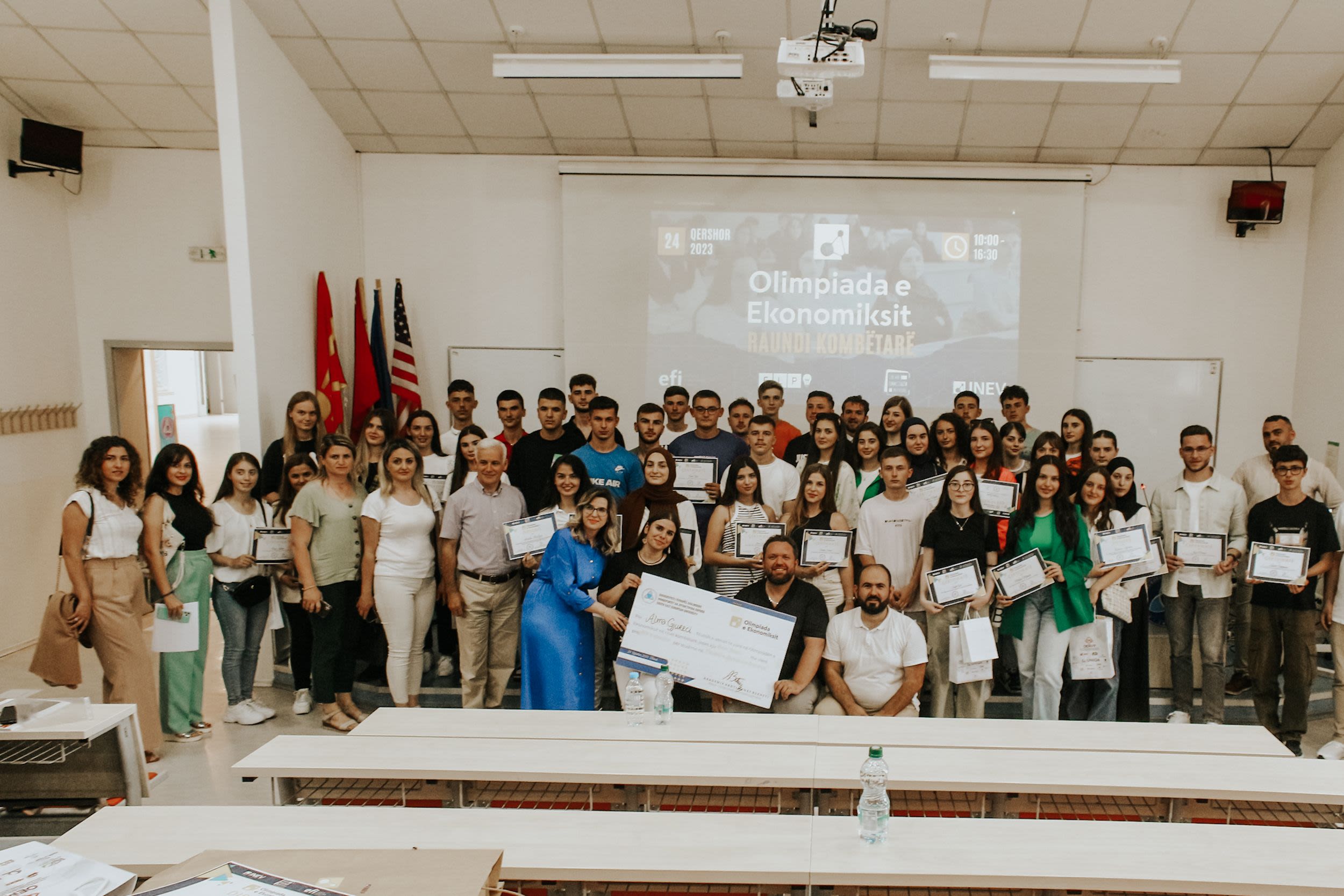
North Macedonia: a small NGO punches above its weight
EFI’s partner in North Macedonia, the Liberal Alternative Institute (LAI), was established in 2012 by a group of young activists returning from their studies in Western Europe and the United States. LAI’s mission is to increase citizen engagement with projects which educate and engage the young people of North Macedonia. Founded on the principles of individual rights, freedoms, and responsibilities, their work is particularly significant in the context of the country’s post-conflict society which still bears the scars of ethnic and religious divisions.
Over the course of a decade, LAI has navigated financial and societal challenges while nurturing a community of active young citizens. Their work has yielded tangible results, but the team was frustrated that their impact was limited.
Orhan Ceka is a founder and the executive director of LAI. EFI's mission to promote economic and financial literacy in post-communist societies resonated profoundly with his aspirations. LAI became an EFI country partner in the fall of 2022, and was awarded a grant which in just a year has enabled the organization to firmly establish itself as a lead campaigner for economic and financial literacy. 23 of the country’s 25 Albanian language high schools, a total of 900 students, participated in the 2023 Economics Olympiad, the first year the country had participated, with LAI managing the competition’s school, regional and national rounds. LAI’s EconLit Caravan travelled to 5 cities, hosting panel discussions on economic learning and promoting “Common Sense Economics”, Orhan has become a regular face on national television, and LAI’s inaugural EconLIT2023 assembled over 100 participants, amongst them university administrators, local and national politicians, entrepreneurs, NGO leaders and journalists.
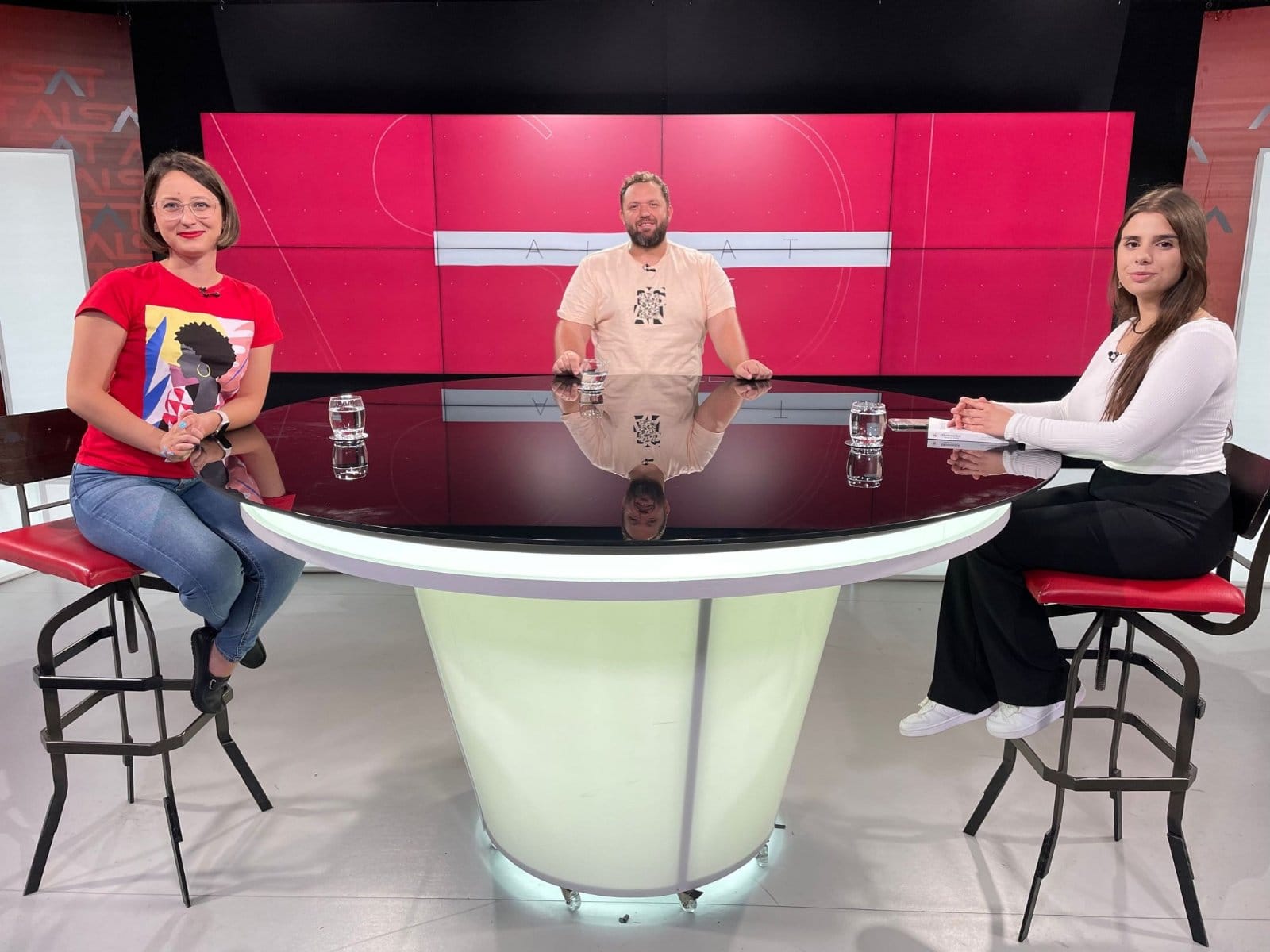
“Seeing what Orhan and the LAI team have achieved in such a short space of time and with only Albanian and English content available to them is hugely inspiring” says Eleanor Hammond, EFI’s Executive Director. “We are looking to secure more funding so that we can add Macedonian learning materials and take our impact to a whole new level!”
Reflecting on LAI’s achievements, Orhan notes: “we began our partnership by promoting “Common Sense Economics” and the Economics Olympiad in Albanian-language schools, universities and municipalities. All our assumptions were proved wrong: it isn't that educators aren’t interested in increasing economic and financial literacy, it's just that no one had ever sought to engage them in developing the solutions. In 10 years, we haven't had the chance to reach that many schools and engage that many students with a single project. I feel I am finally doing what I embarked on in 2012”.
"The collaboration we’ve established with EFI is unlike any other donor relationship”, says Orhan. “It’s a partnership rooted in a shared vision, constant support, inspiration, and joint actions. The flame for change that existed in me in 2012 when we established LAI has been reignited.”
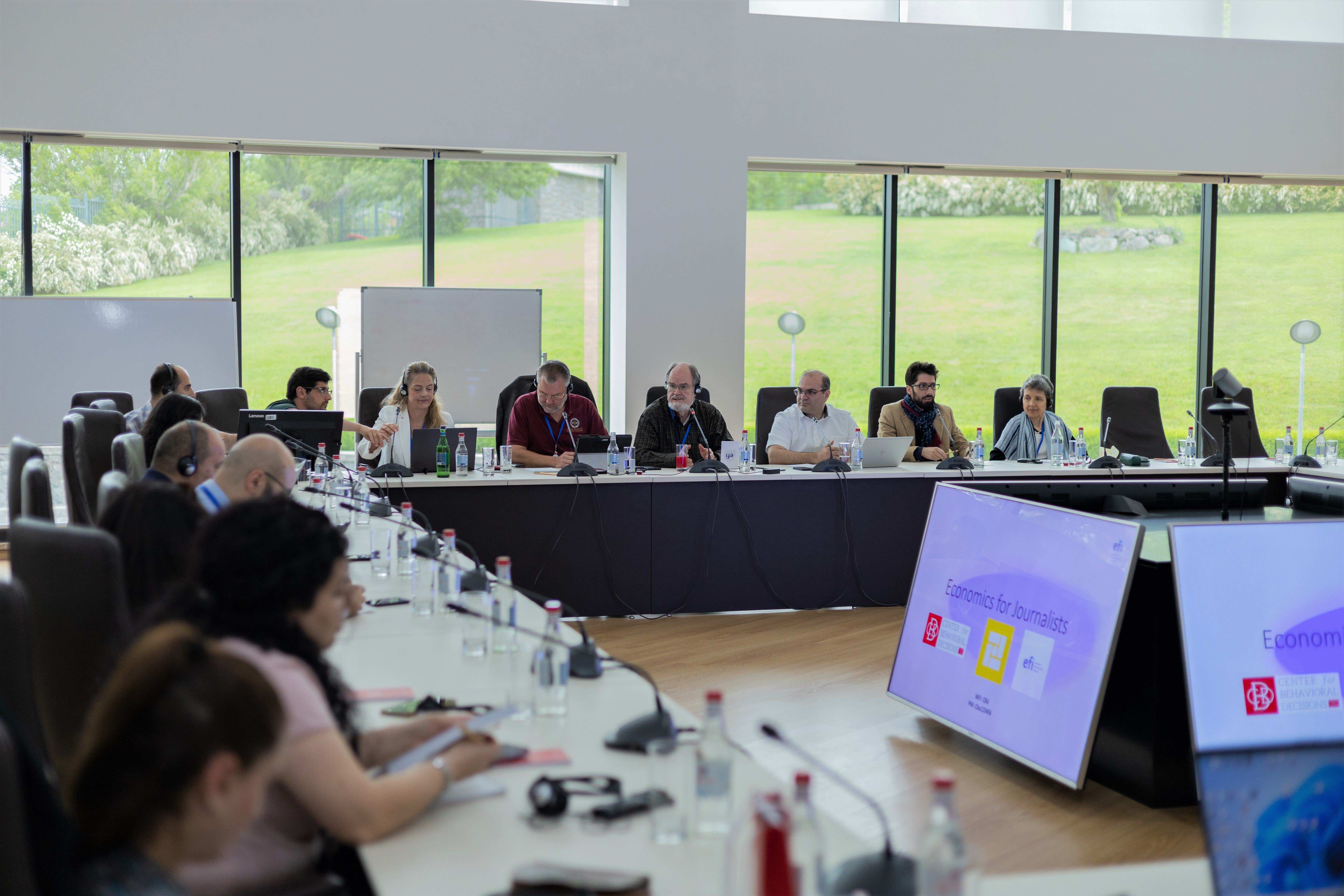
South Caucasus: Economic Reporting Workshops Offer The Exchange of Ideas
Seasoned and trainee journalists in Armenia, Georgia and Azerbaijan had an unusual professional development opportunity this summer thanks to workshops run by EFI and members of the “Common Sense Economics” authorial team. Professor Joe Calhoun from the Stavros Center for Economic Education at Florida State University and Professor Tawni Ferrarini from the Hammond Institute for Free Enterprise at Lindenwood University in Missouri joined EFI President, Professor Randall Filer to lead economic reporting workshops. The authors shared practical techniques for making economic reports accessible and relatable to wider audiences. Many of the participants highlighted the challenge of ‘translating’ economic jargon into understandable language without losing the meaning and purpose of the message, a challenge that is certainly not unique to journalists in the South Caucasus.
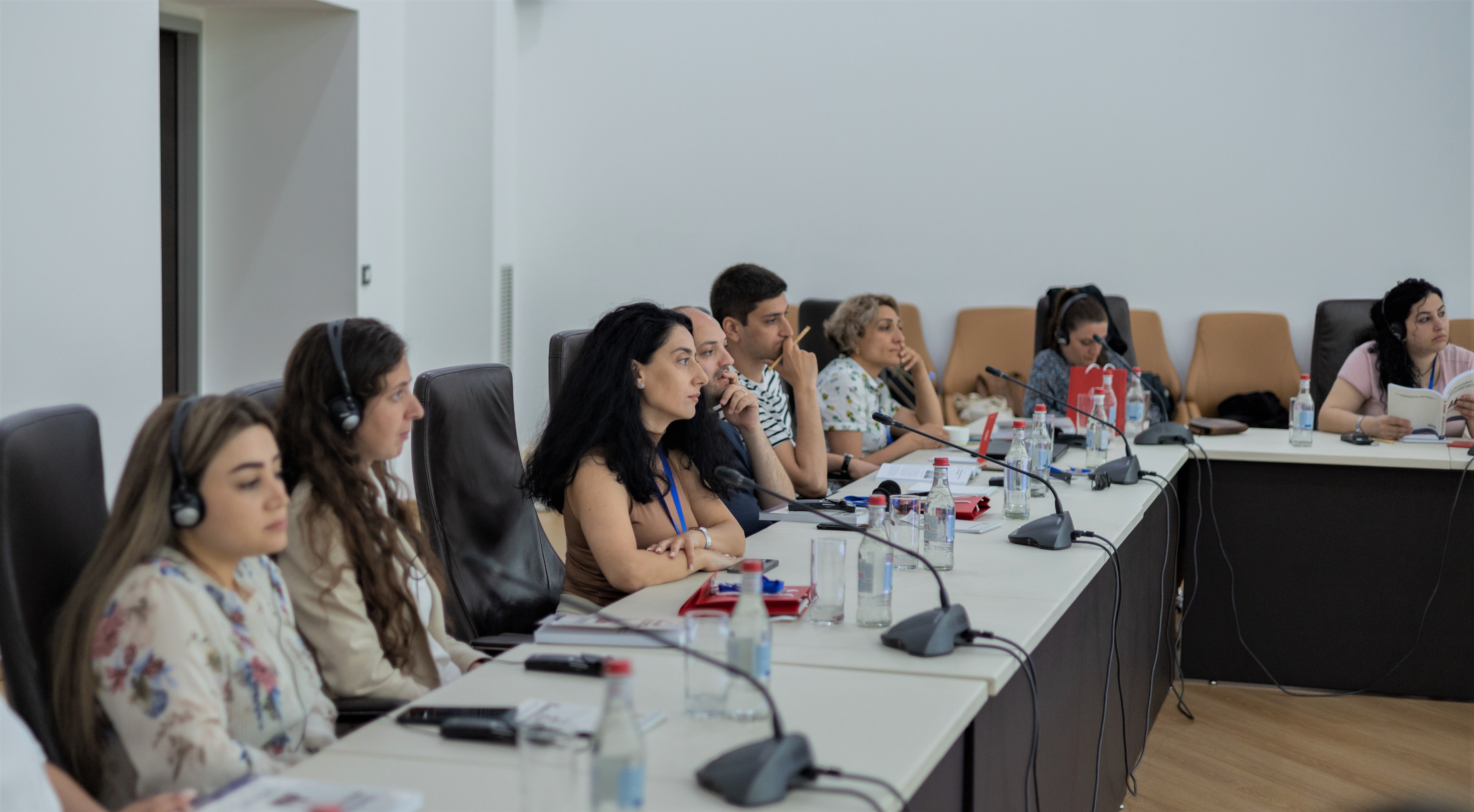 The workshop leaders struck a balance between covering fundamental economic principles while
keeping experienced journalists fully engaged. “We did dig into some heavy
topics, ranging from inflation to monetary policy and international trade
affairs. But even these were brought back to their common sense
roots, highlighting how excessive inflation, unstable economic policies,
and restrictive trade policies harm society, especially the most marginalized
communities” comments Professor Ferrarini.
The workshop leaders struck a balance between covering fundamental economic principles while
keeping experienced journalists fully engaged. “We did dig into some heavy
topics, ranging from inflation to monetary policy and international trade
affairs. But even these were brought back to their common sense
roots, highlighting how excessive inflation, unstable economic policies,
and restrictive trade policies harm society, especially the most marginalized
communities” comments Professor Ferrarini.
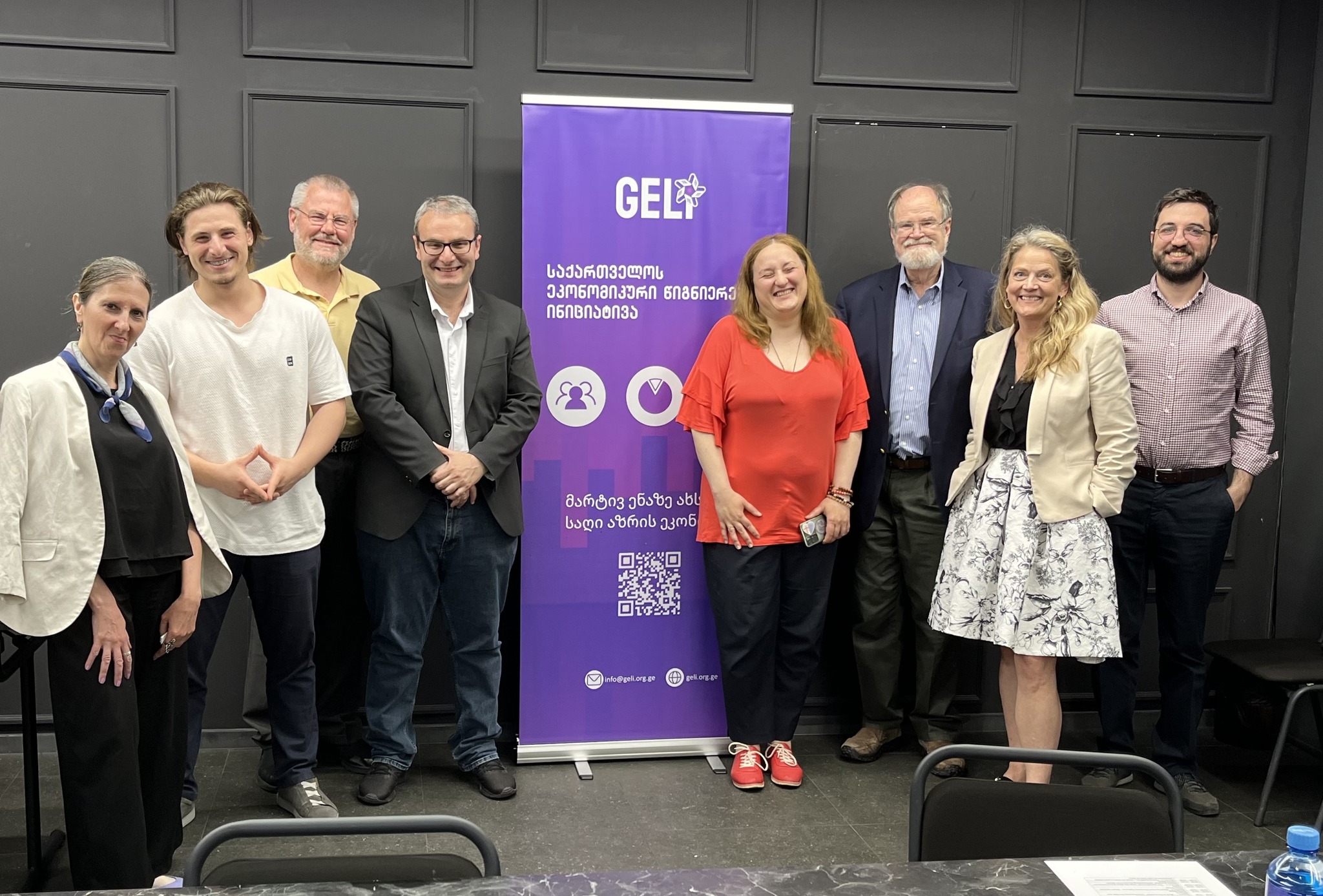
For the almost 40 journalists and students of journalism who participated in the sessions, their feedback reinforced the value which these offered, not only for them to network with their peers, but to discuss ideas with “outside” experts: “The most interesting parts for me were the suggestions and evaluations of the economists outside of the Armenian economic ecosystem”, remarked one attendee. “All the events were truly a collaborative effort, with everyone learning from others in the room”, remarks Professor Calhoun. “Each workshop was a tremendous opportunity for me to learn and to understand the countries’ economic histories and opportunities”.
National media outlets also gave extensive coverage to the team during their time in the region, with multiple TV interviews, including the popular "Bari Luys, Բարի Լույս, Good Morning" show in Armenia, and Forbes Georgia's "The Checkpoints" show.
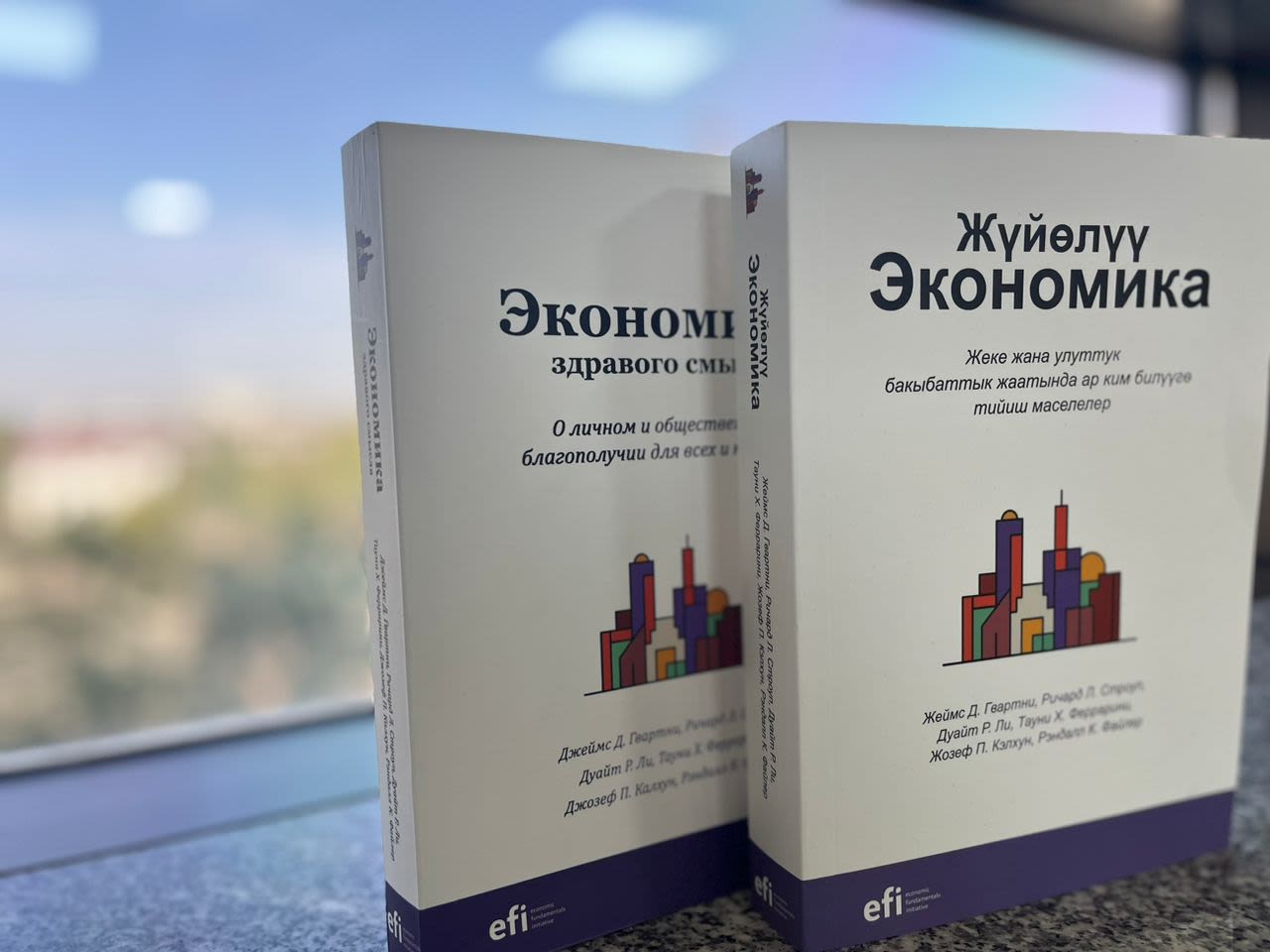
Kyrgyzstan: Bringing Learning Opportunity to Students in Isolated Regions
How would you learn if there were no materials in your native language? For countries whose education systems were dominated by Russian for decades, the obstacles to learning remain for many. Kyrgyzstan is no exception. For people living outside the country’s large cities, the lack of Kyrgyz language educational resources is a significant challenge to their personal development. Levels of financial and economic literacy in particular are low.
The Kyrgyz edition of “Common Sense Economics” was published in 2022. EFI is excited to be partnering with the Institute of Public Policy and Administration at the University of Central Asia not just to promote the book, but to use it as the foundation of a far wider program of activity focused on raising financial and economic literacy across the country. As Russian is an official language of the country, the Russian edition is also available.
Over the past months, thanks to the Kyrgyz Ministry of Education and Science, 600 copies of the Kyrgyz and Russian language editions of “Common Sense Economics” have been distributed to school libraries in Naryn, Issyk-Kul, Chui and Talas regions.
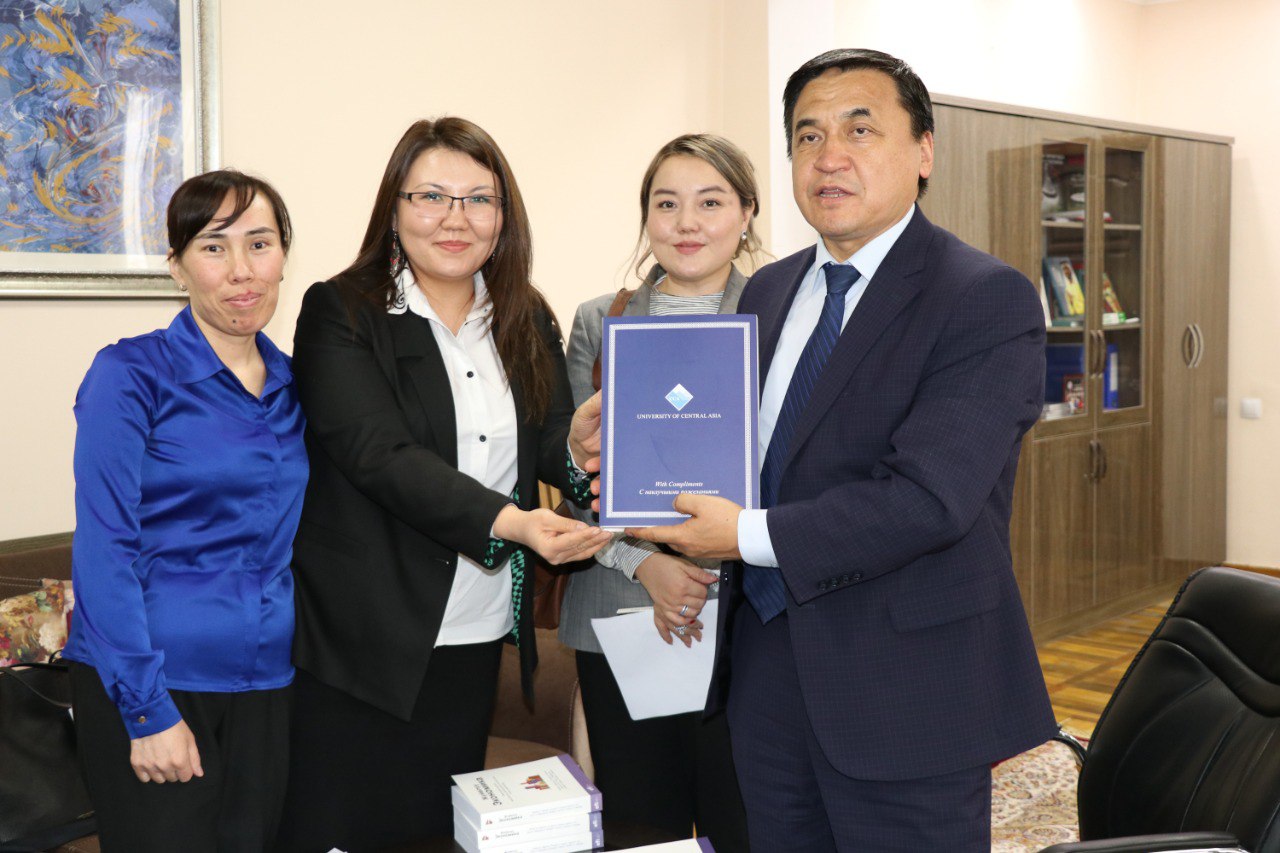
Kemel Toktomushev is Senior Fellow at UCA IPPA and leads EFI’s country partner team in Kyrgyzstan. “The scarcity of professional economic literature available in the Kyrgyz language is an ongoing problem. The collaboration between UCA and EFI is a positive step forward in addressing this gap”.
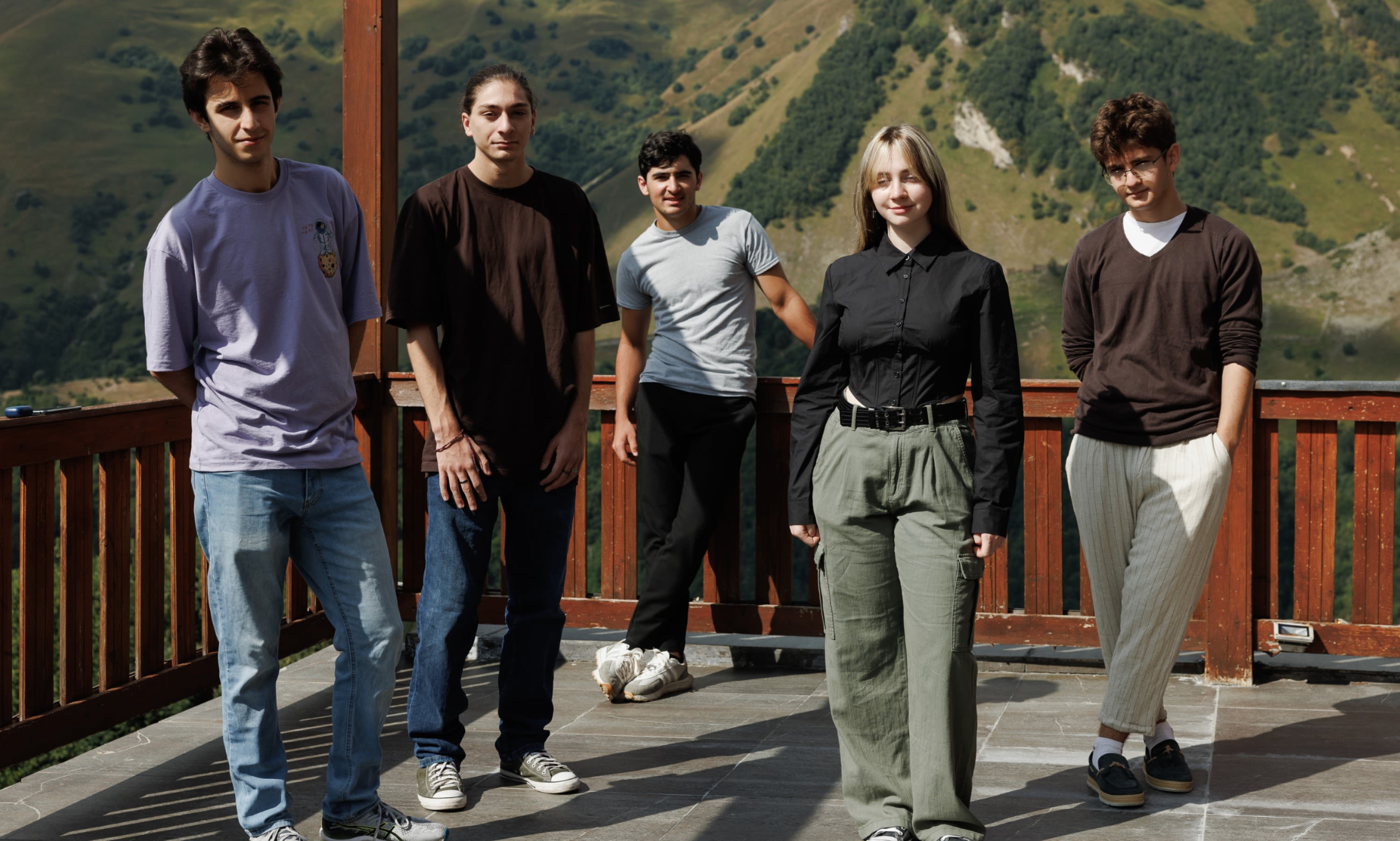
Georgia: a summer camp in the sun delivers winning results
More than 1200 students from 318 of Georgia’s high schools took part in the 2023 Economics Olympiad, an international competition designed to inspire interest in economic learning in young people. The 5 winners of the national round progressed to the final international round that took place in Bratislava in September.
To prepare Georgia’s winners to compete against their peers from 13 other countries, the Georgian Economic Literacy Initiative organized a training program, supported by the Bank of Georgia, the Ministry of Education and Science, Business Media Georgia (BMG) and educational platform Orjer Ori.
The students attended 6 online lectures to provide them with a solid theoretical foundation in economics. After completing the course, they participated in a summer camp in the mountain resort of Gudauri. The course was led by economic consultant Aleksandra Shalibashvili, a lecturer at the Free University of Tbilisi and teaching assistant at the International School of Economics at Tbilisi State University (ISET).
A series of lectures were aimed at deepening their understanding of economics and its real-world applications, while independent and collaborative activities also encouraged the students to try their knowledge in a dynamic, team-driven setting. And, of course, it wasn’t all work; plenty of time to enjoy economics-themed board games, implementing in practice the concepts of limited resources and gains from trade through the game of Catan, and leisurely hikes amidst the stunning mountainous landscapes surrounding the hotel.
The results? 3 of the 5 students made it into the Top 20 at the international final round! Proof that work hard/play hard delivers powerful results!

The future of my country is in the hands of people just like me
Economics easily explained. That’s our mantra at EFI. And so what would make more sense than to support 8 of our partners to run an Economics Olympiad for high school students in their countries. The Olympiad is a fast-growing international competition with 80,000 students from 16 countries taking part this year. After multiple in-country rounds, 70 students met at the University of Economics in Bratislava, Slovakia, to compete against each other for the top places.
In preparing for each round, students had access to EFI’s learning resources, including our translated editions of “Common Sense Economics” and the contents of our multimedia library. Teachers set aside time to support their students and our country partners held online and offline summer camps to prepare their national champions for the international round.
How did it turn out? Across EFI’s countries 9,000 students took part in the competition. Of the 40 who made it to the international round, 8 were ranked in the Top 30. But it’s more than a numbers game. Together with our country partners, EFI is changing lives. One of our finalists from Ukraine, unprompted, summed up her experience: “From the initial selection to the finals, my life has changed significantly, without exaggeration. While preparing for the competition and progressing through each stage, Economics transformed from a typical school subject into a key to understanding the sociopolitical and historical events currently unfolding around us. Before the war, I was just a child who found economics excessively complex and politics hopelessly dull. However, now my perspective has done a 180-degree turn, and it's economics that has guided me. During the Olympiad, I learned so much. I believe it has made me a more aware person, giving me an understanding that the future of my country is in the hands of people just like me.”
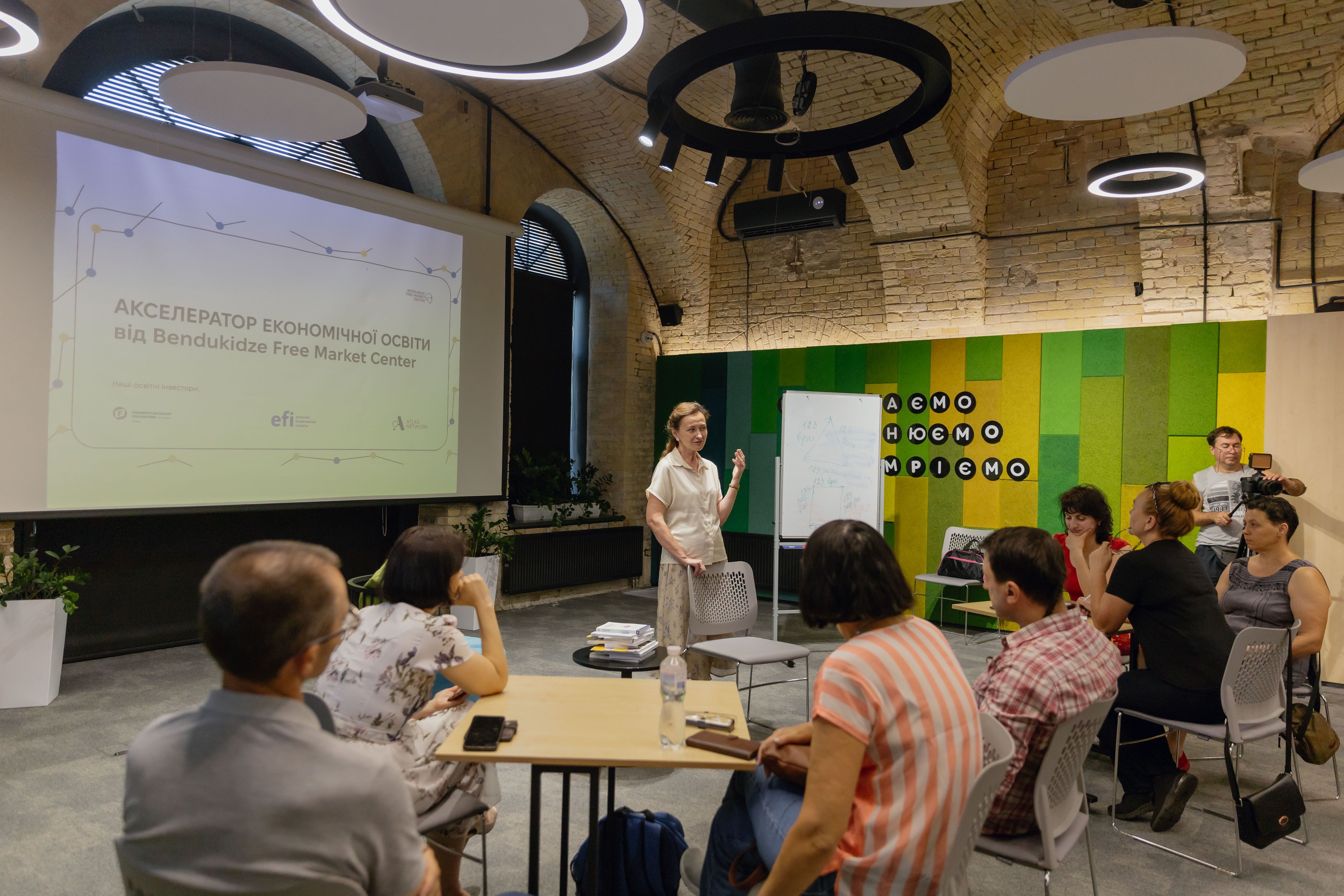
A different kind of educational collaboration
EFI’s partner in Ukraine, Bendukidze Free Market Center, works with teachers across the country to help improve the ways in which economics is taught. This summer, invited by the Poltava Business Association to help develop the economic thinking of the region’s teenagers and their parents, BFMC ran a three-day Economic Education Accelerator for 150 teachers. Most of them had no previous experience of teaching economics.
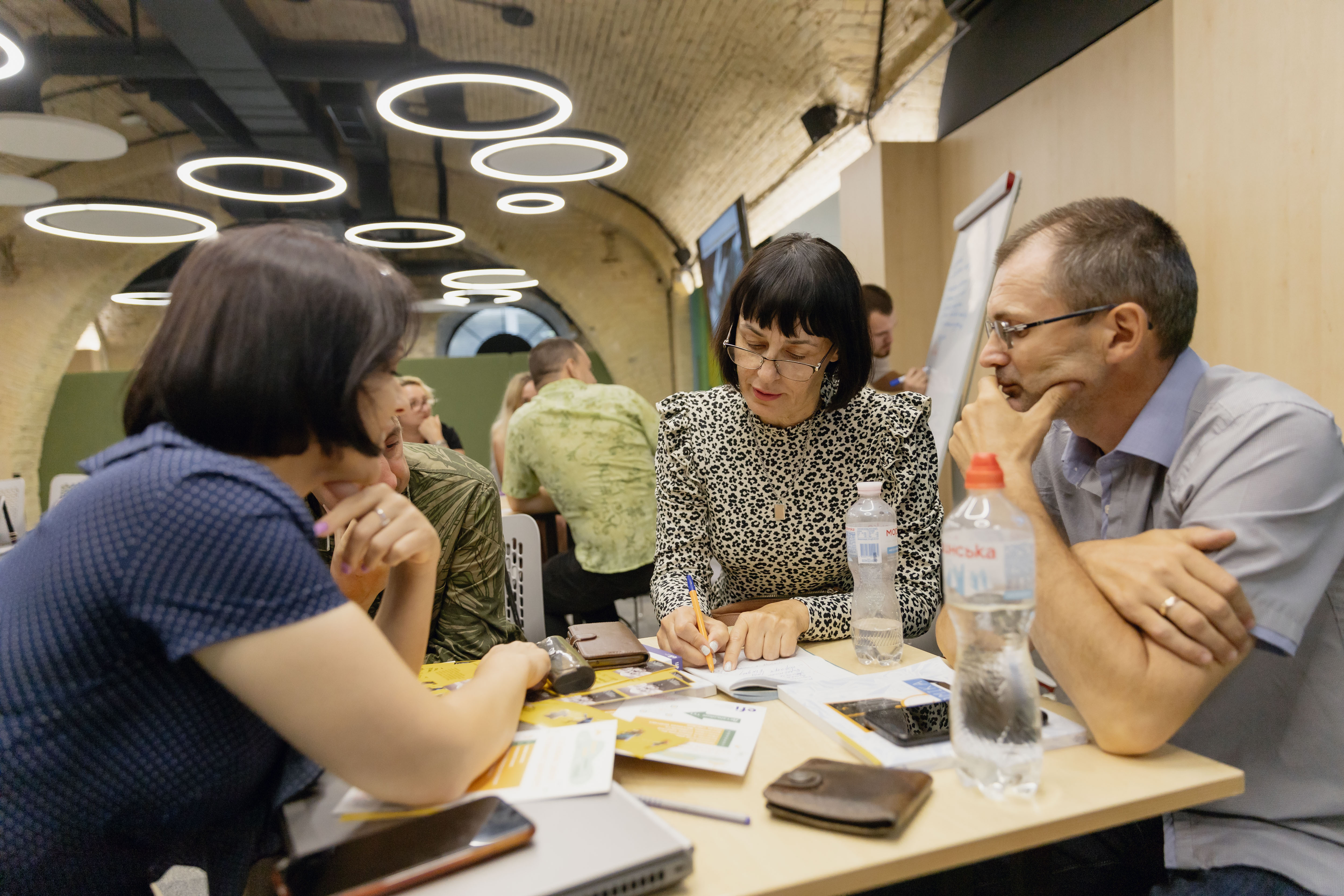
The training focused on immersive learning, teaching basic principles of economics, as well as tools and resources that help turn everyday economics into a common sense experience! Together with EFI, BFMC works to put the fun into learning – and teaching - economics!
From September, these teachers will lead economics classes for 8th and 9th grade students, using EFI’s translated edition of “Common Sense Economics” and our Teacher Toolkit. We look forward to seeing how this evolves!
Commenting on the project, a spokesman from Poltava Business Association said: “This is our joint investment in the development of society for tens and hundreds of years. The project Economic education in Poltava region is the first example of educational collaboration of socially responsible business, proactive public organizations and local authorities”.
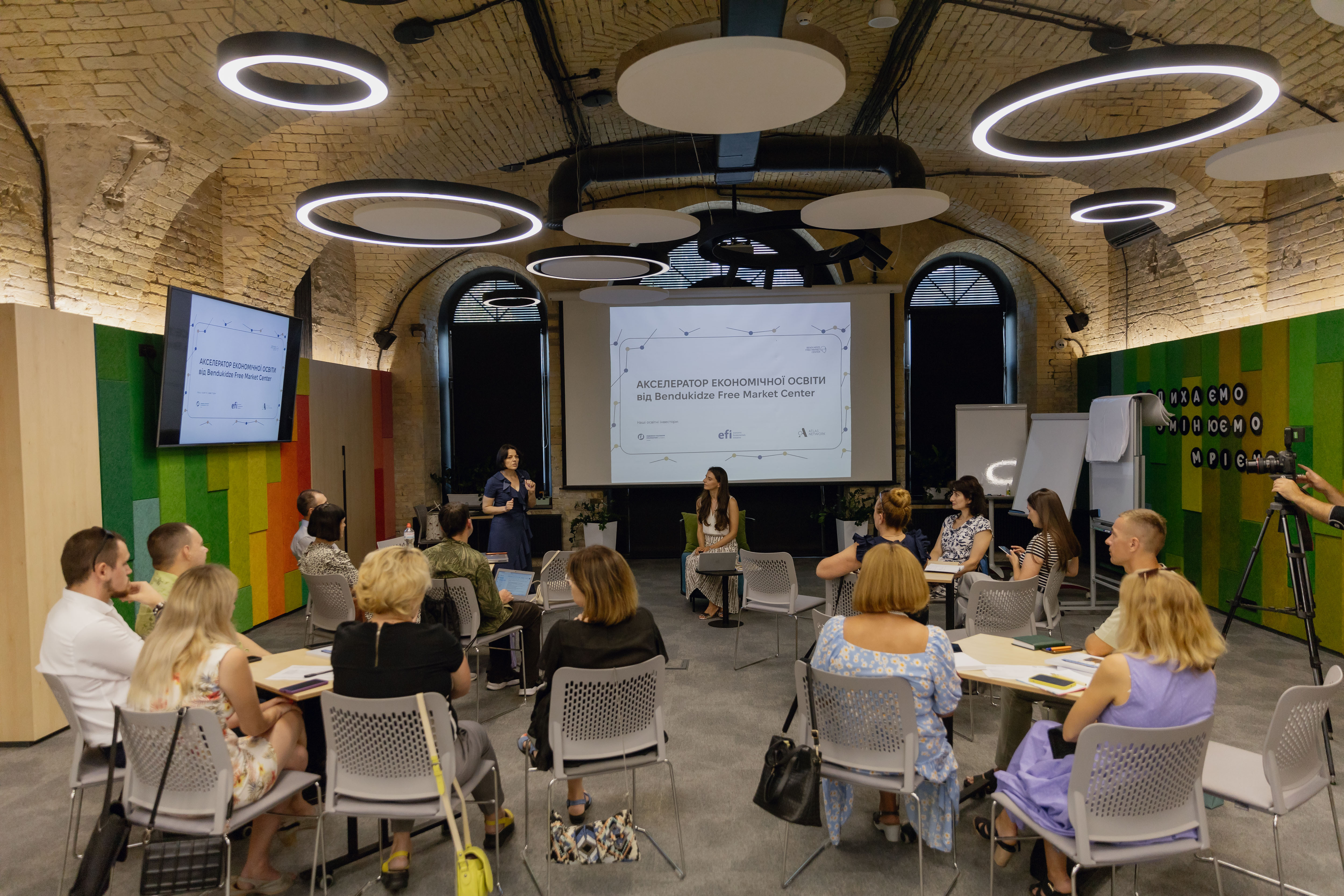
The final words go to Nataliya Melnyk at BFMC: “With each new group of teachers who join our trainings, we promote and transform economic education in Ukraine. Together with them, we make economics as a school subject come to life for schoolchildren, so that lessons are not some uninteresting letters on paper, but a real experience for kids, that will prepare them for a successful adult life. Because our whole life is economics”.
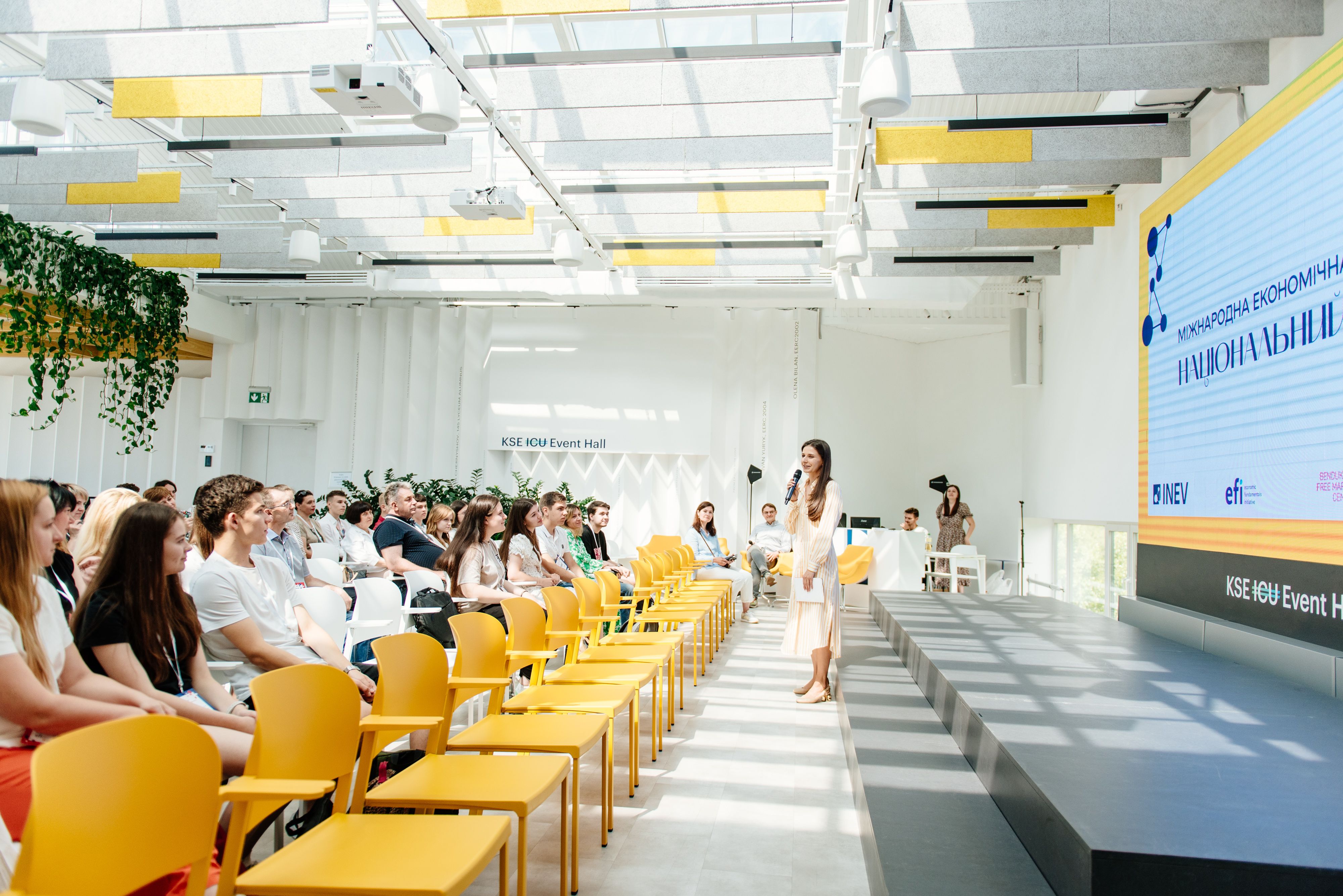
Competing across countries
This year, EFI has supported its partners in 8 countries to oversee the Economics Olympiad, a multi-round competition for high school students which culminates in an international final that will be held in September in Slovakia. Across Armenia, Azerbaijan, Georgia, Kazakhstan, Kosovo, Kyrgyzstan, North Macedonia and Ukraine, 9000 high school students from more than 900 schools took part. The competition was launched in 2017 by the Czech Institute of Economic Education (INEV), and has grown from 4,000 students in its first year to over 75,000 students from 17 countries participating this year.
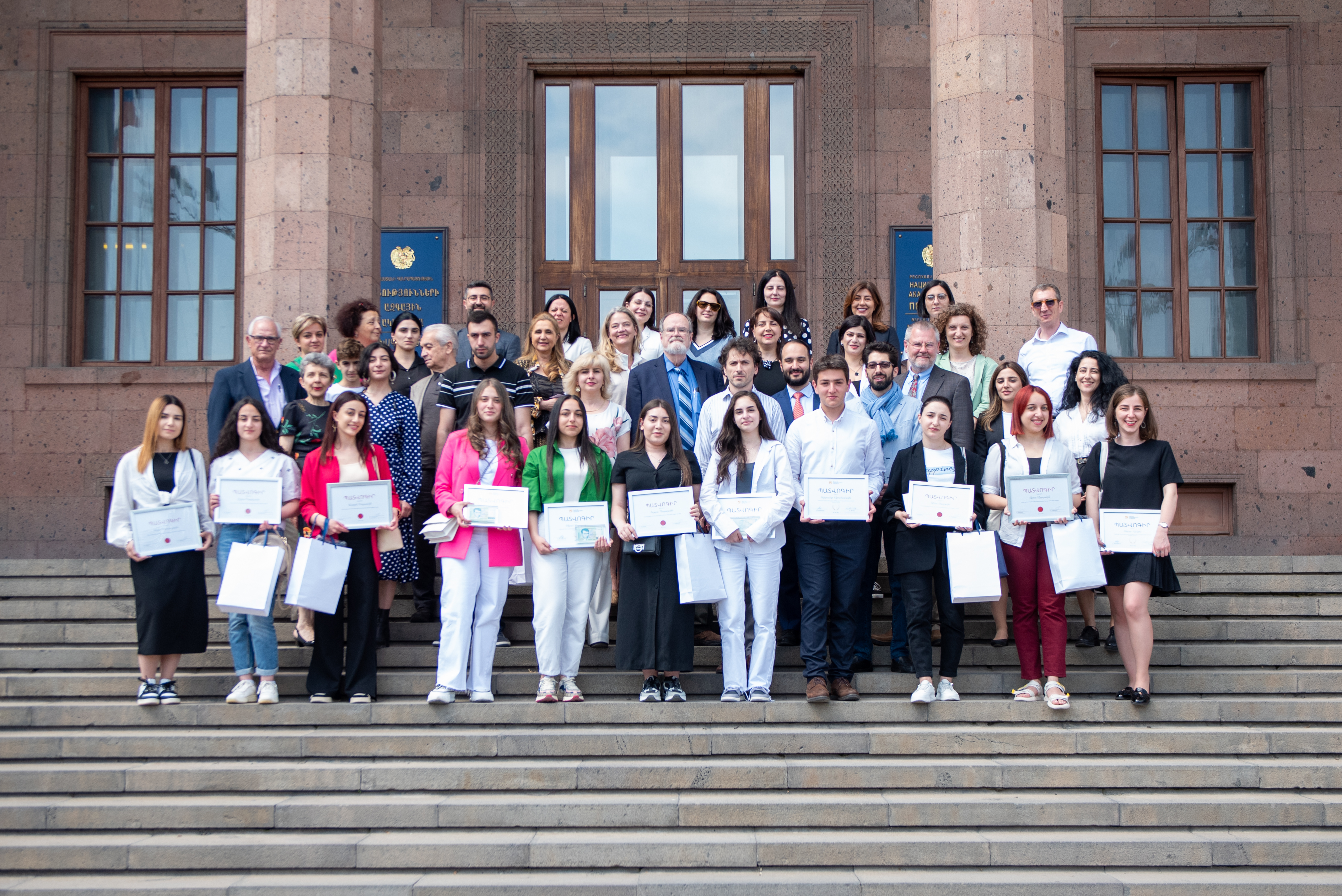 No prior knowledge of economics is needed to participate. Students looking to prepare can
download for free translated editions of “Common Sense Economics” from our website and
explore the many videos and articles available in our library. EFI’s country partners
work with schools to promote the competition, encourage their participation and support
teachers as they prepare their students. The first round is an online multiple choice test
supervised by teachers. Depending on the size of the country, a regional round may be held,
followed by a national round made up of a written exam and oral interviews with the jury
panel. Prizes are determined by the country partner and range from cash, tablets, gift cards
and even university scholarships. We are really excited by the support given to the
competition this year by local business and academic communities and expect to see a
major increase in both competitors and supporters in 2024.
No prior knowledge of economics is needed to participate. Students looking to prepare can
download for free translated editions of “Common Sense Economics” from our website and
explore the many videos and articles available in our library. EFI’s country partners
work with schools to promote the competition, encourage their participation and support
teachers as they prepare their students. The first round is an online multiple choice test
supervised by teachers. Depending on the size of the country, a regional round may be held,
followed by a national round made up of a written exam and oral interviews with the jury
panel. Prizes are determined by the country partner and range from cash, tablets, gift cards
and even university scholarships. We are really excited by the support given to the
competition this year by local business and academic communities and expect to see a
major increase in both competitors and supporters in 2024.
The 5 finalists from each country will compete at the international round in Bratislava in September. Follow us on LinkedIn, Facebook and Instagram to find out who wins!
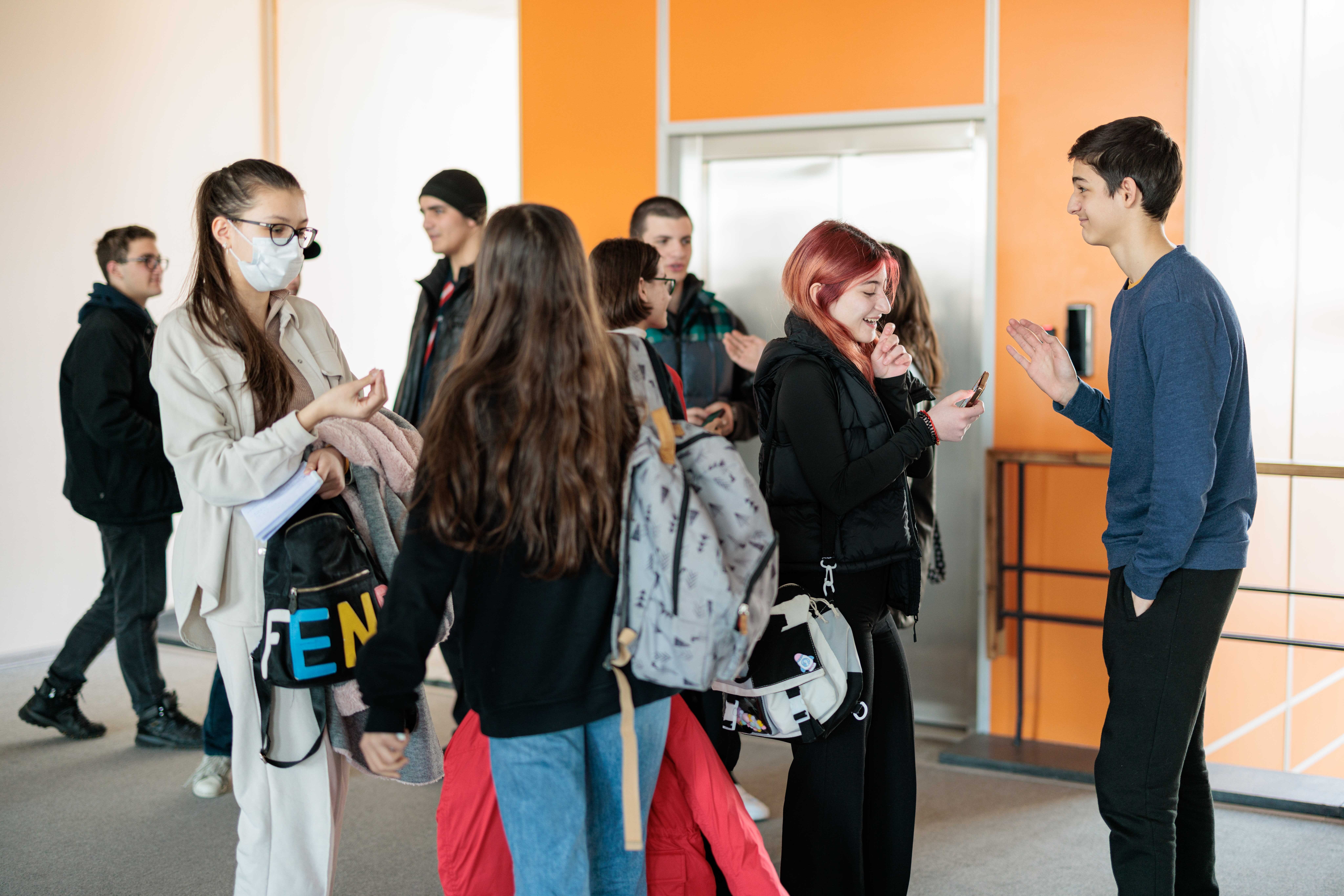
Pushing curriculum reform
For the past two academic years, EFI has supported its partner in Georgia, the Georgian Economic Literacy Initiative, to design and deliver an introductory economics course for 10th and 11th grade students at one of the country’s top high schools, Komarovi. The course follows the structure of “Common Sense Economics” and was the catalyst for the development of EFI’s Teacher Toolkit. The Toolkit contains slide decks, instructor notes and assignment suggestions so that teachers can with ease introduce economics into their classrooms. We are delighted that Komarovi was among 300 schools who took part in the Economics Olympiad this year; 15% of the 230 students advancing to the national round were from the school.
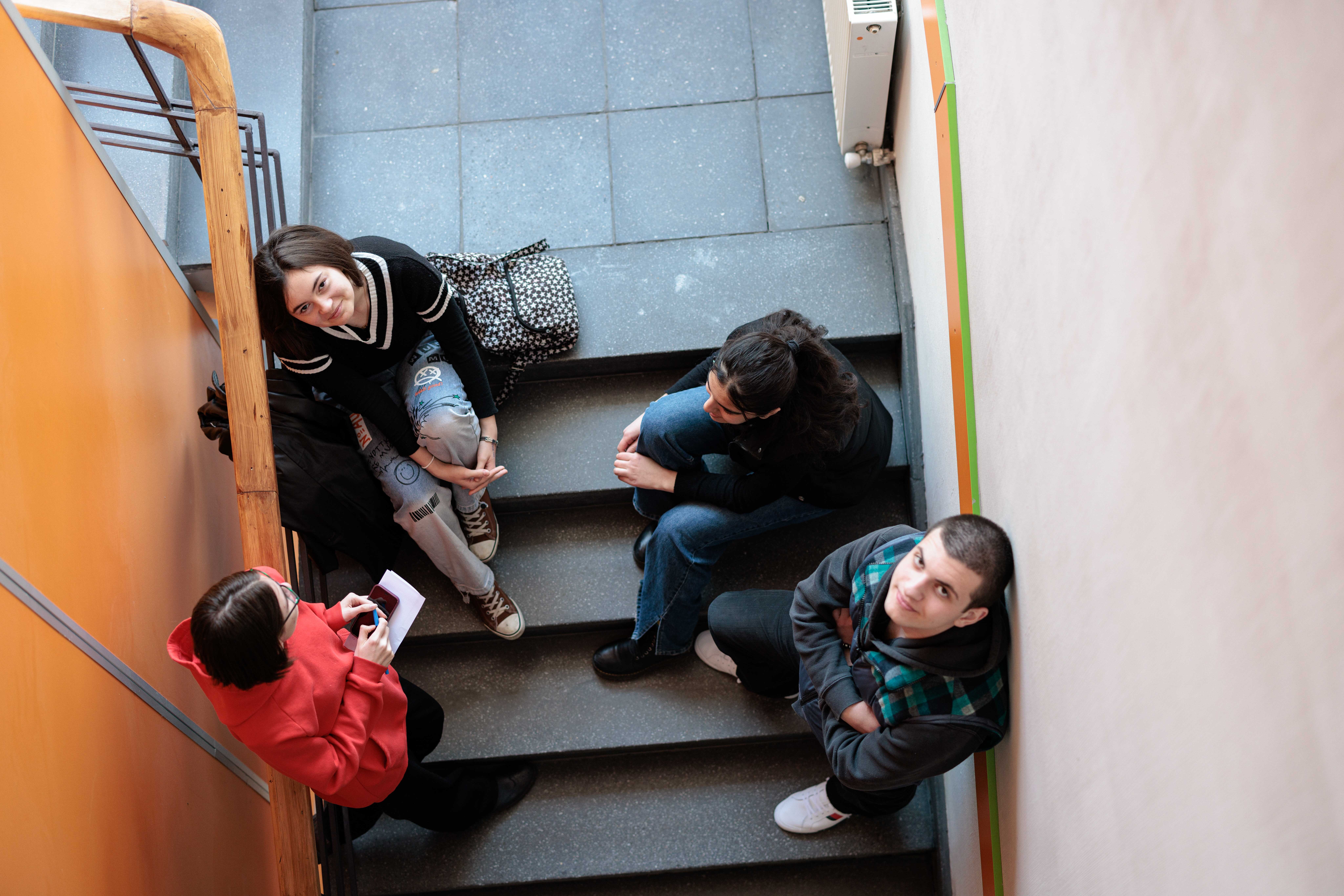 The course has been taught by economics master’s graduates from the International School
of Economics at Tbilisi State University (ISET), trained and supported by GELi. Two cohorts
totaling 500 students have now completed the course which is mandatory. Thanks to GELi’s
capacity development, Komarovi teachers will be teaching the course themselves from the
23/24 school year, allowing GELi resources to be redirected in support of other schools.
GELi is currently advising the government on developing a national economics curriculum. It
is EFI and GELi’s ambition that economics should become a standard and mandatory
element of learning in secondary schools.
The course has been taught by economics master’s graduates from the International School
of Economics at Tbilisi State University (ISET), trained and supported by GELi. Two cohorts
totaling 500 students have now completed the course which is mandatory. Thanks to GELi’s
capacity development, Komarovi teachers will be teaching the course themselves from the
23/24 school year, allowing GELi resources to be redirected in support of other schools.
GELi is currently advising the government on developing a national economics curriculum. It
is EFI and GELi’s ambition that economics should become a standard and mandatory
element of learning in secondary schools.
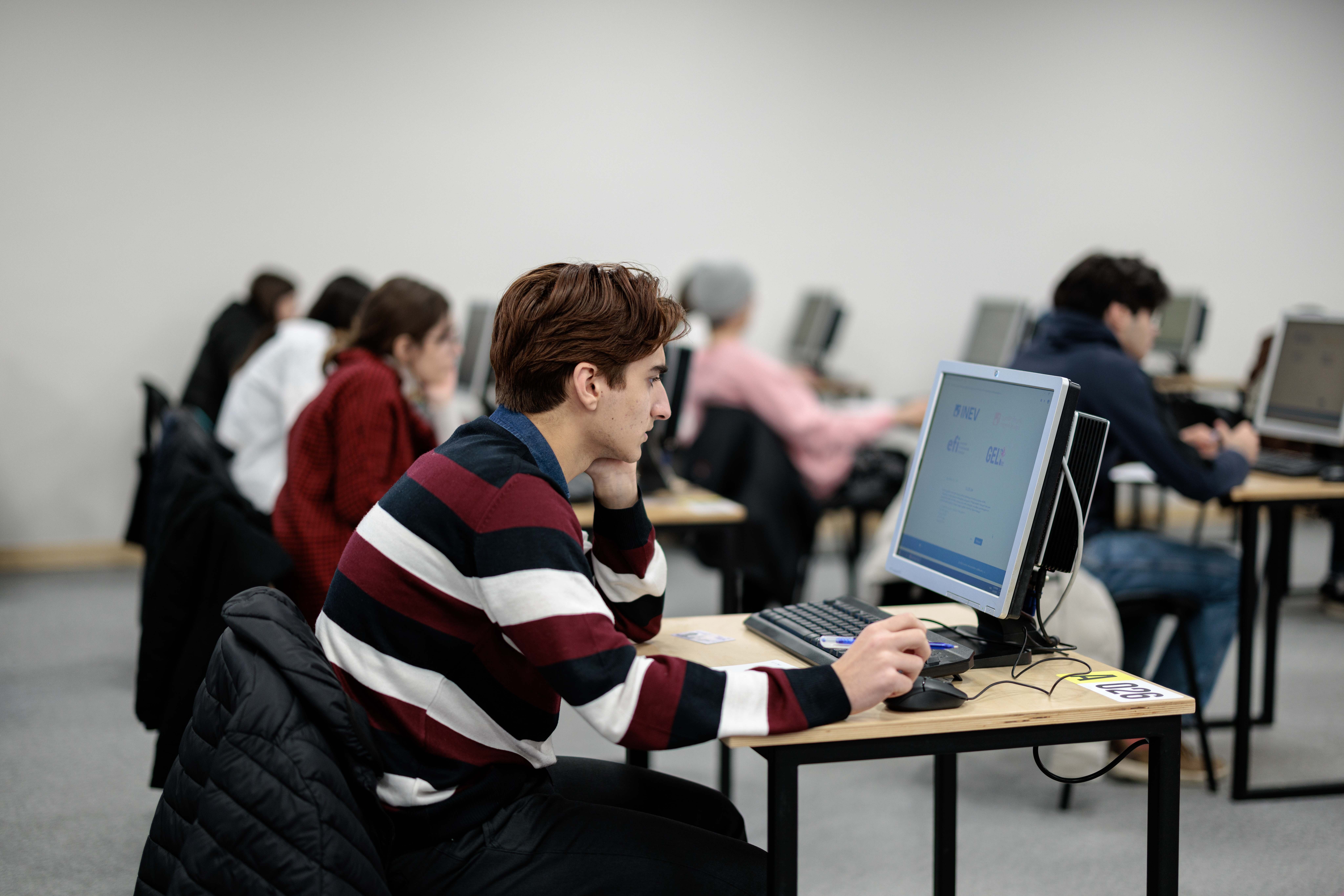 Want to find out more about what the Georgian Economic Literacy Initiative is doing to
improve understanding of basic economic and financial principles in Georgia? Pay a visit to
GELi’s partner area!
Want to find out more about what the Georgian Economic Literacy Initiative is doing to
improve understanding of basic economic and financial principles in Georgia? Pay a visit to
GELi’s partner area!
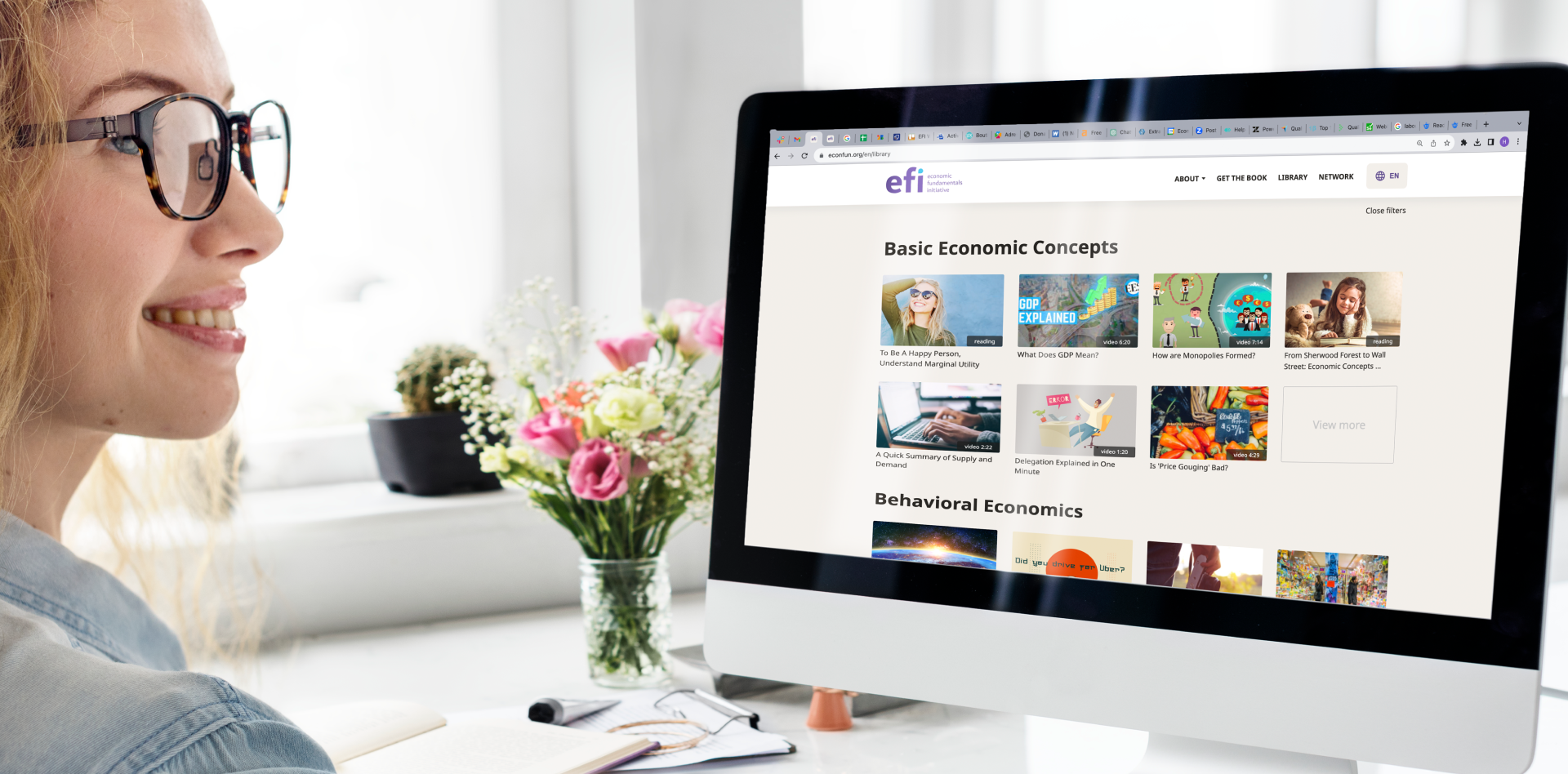
Bridging the language divide
EFI’s multimedia library is a treasure trove of economic content for learners and teachers alike. It contains a continually expanding collection of videos and articles, categorized and searchable by topics that range from entrepreneurship and personal finance, to free trade and economic freedom.
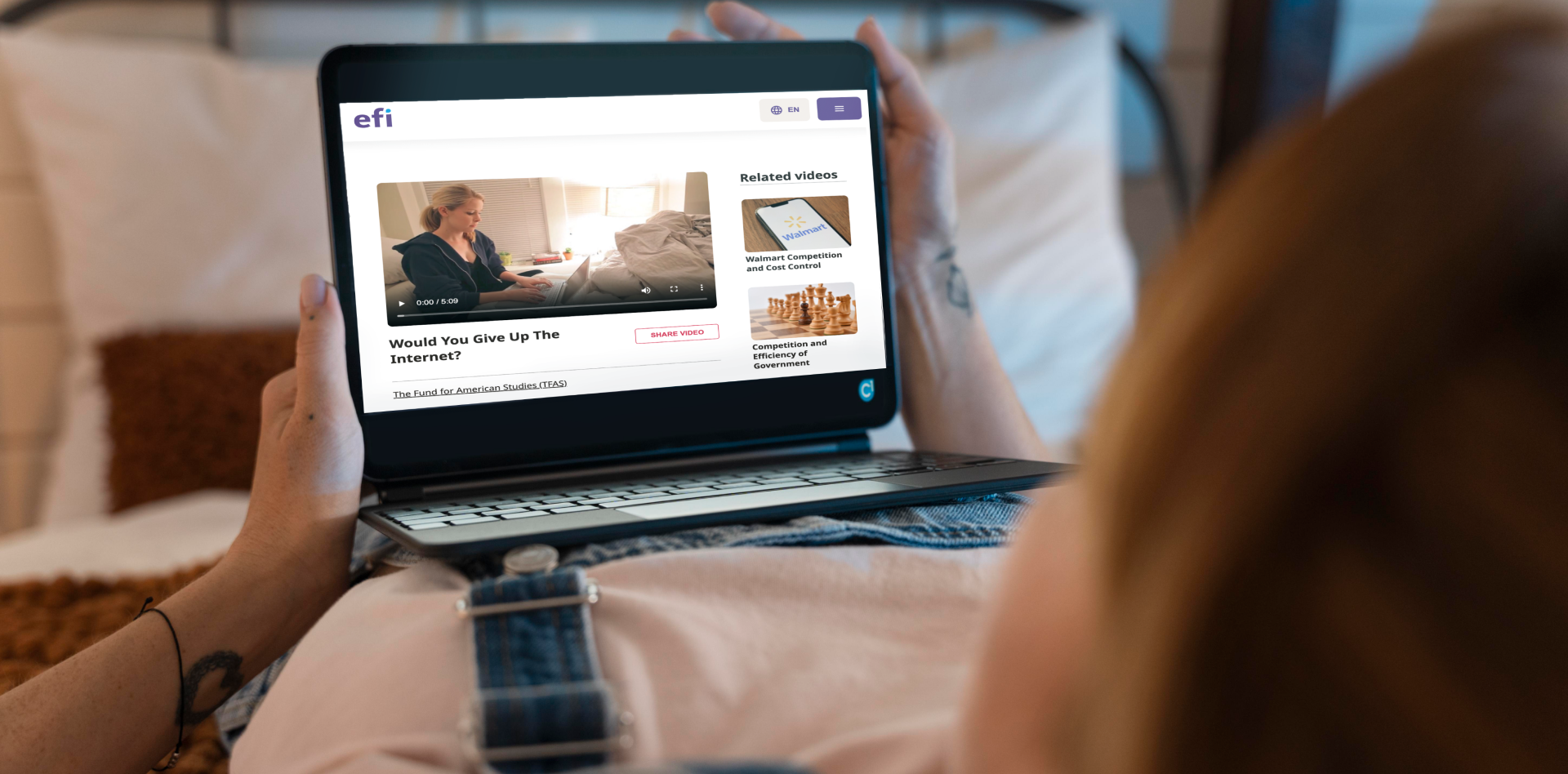 The collection is provided by educational content providers, mainly in the U.S. and western
Europe. EFI’s in-house economists select the material they judge most relevant to audiences
in our region, which is then translated and subtitled, and promoted to students and
teachers by our network of country partners.
The collection is provided by educational content providers, mainly in the U.S. and western
Europe. EFI’s in-house economists select the material they judge most relevant to audiences
in our region, which is then translated and subtitled, and promoted to students and
teachers by our network of country partners.
“Common Sense Economics” co-author Professor Joe Calhoun is among those whose institutions make their content available to EFI. “I’m proud to partner with EFI to enhance understanding of these important concepts”, says Joe, Director of the Stavros Center for the Advancement of Free Enterprise and Economic Education at Florida State University. The Foundation for Economic Education, Stossel in the Classroom and the Free to Choose Network are among the library’s many other Content providers. Have you visited our library yet? Start your learning journey today!